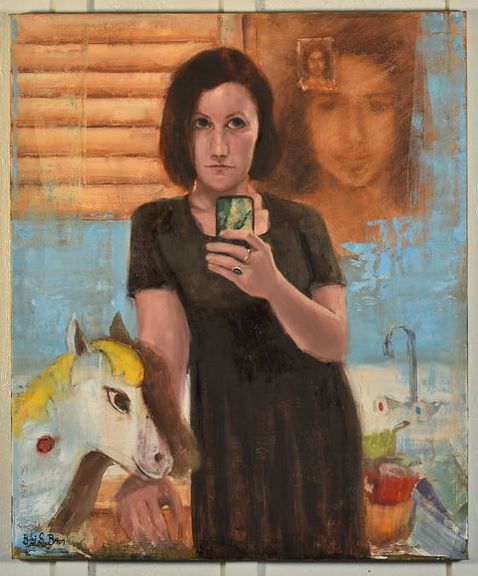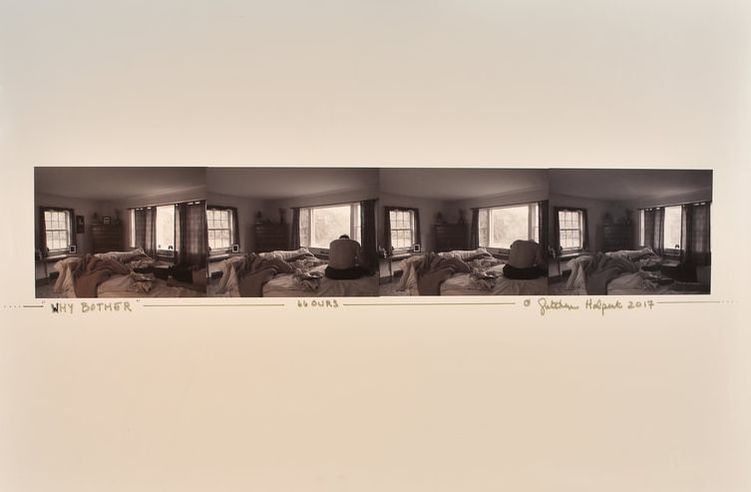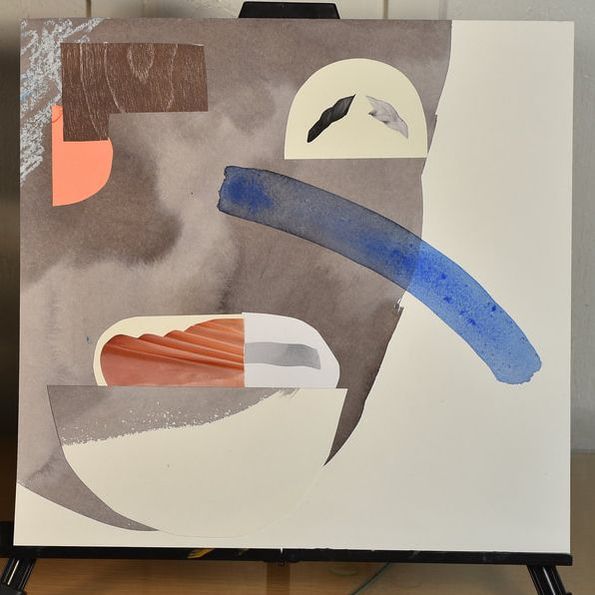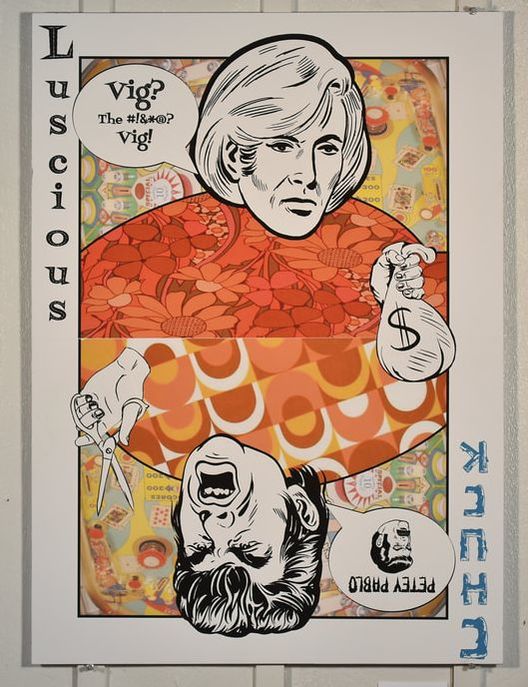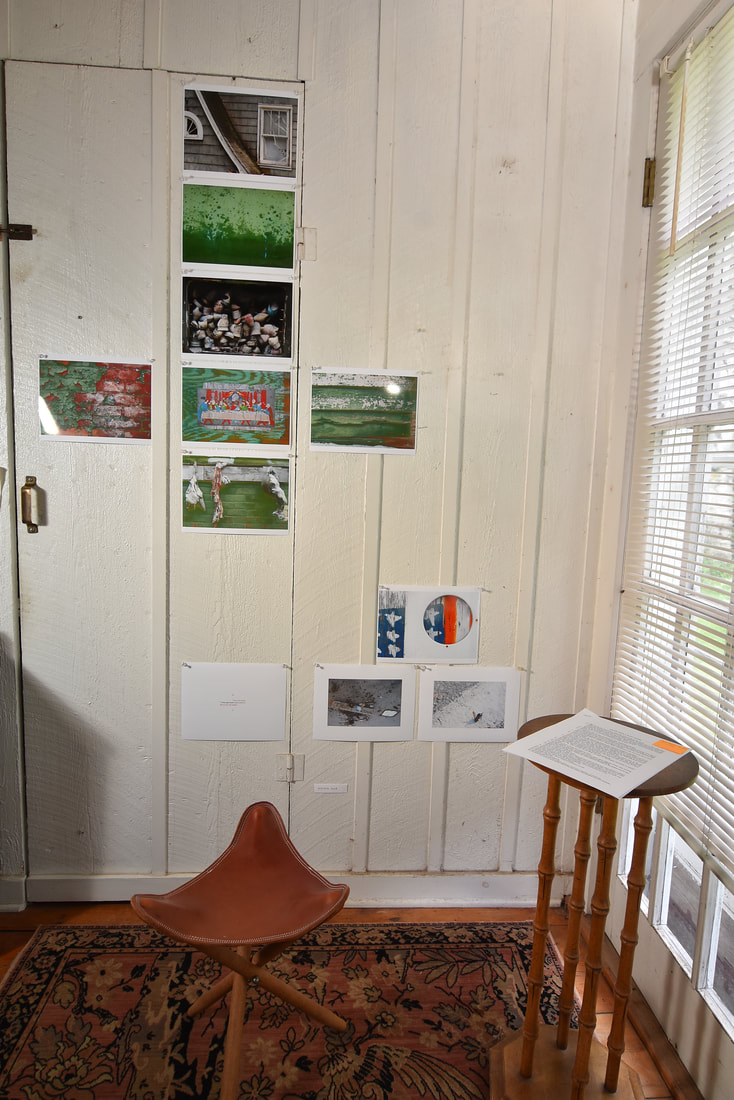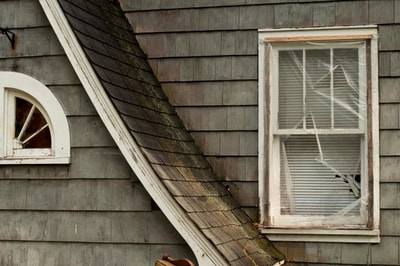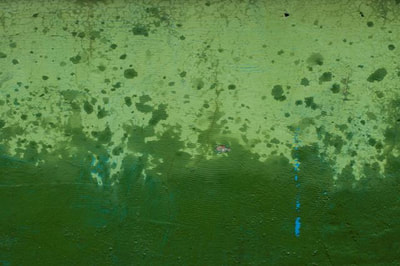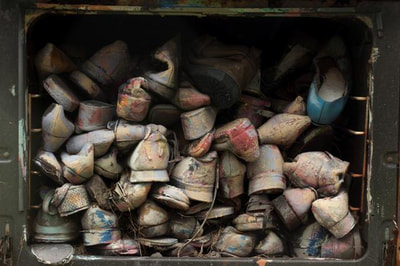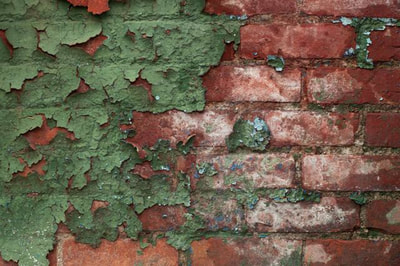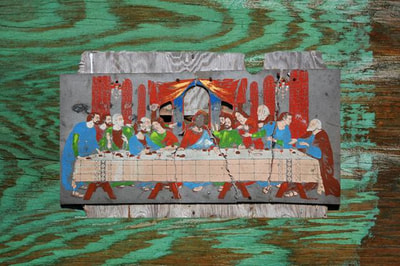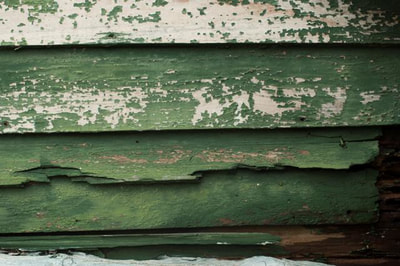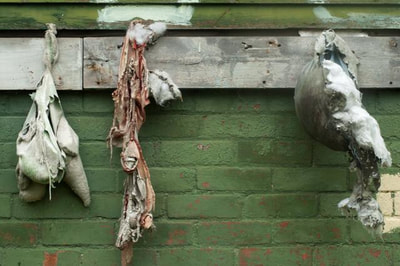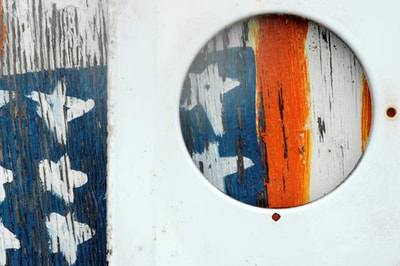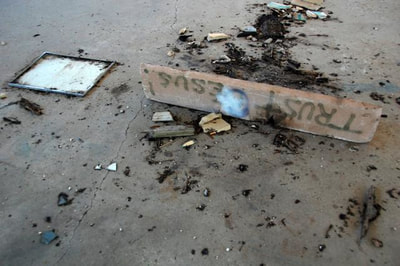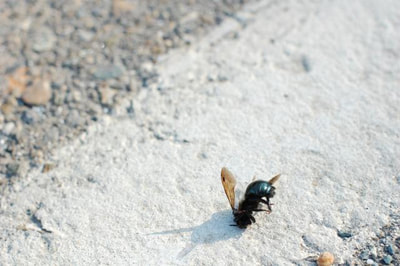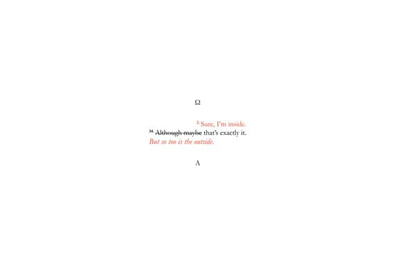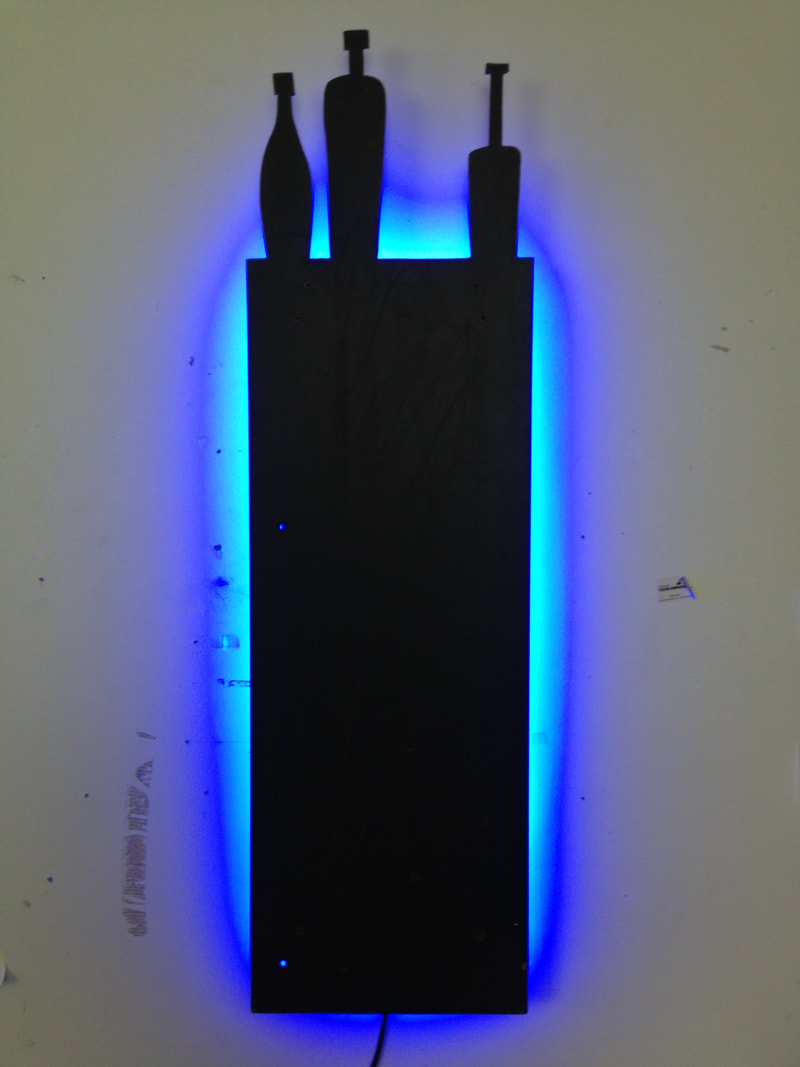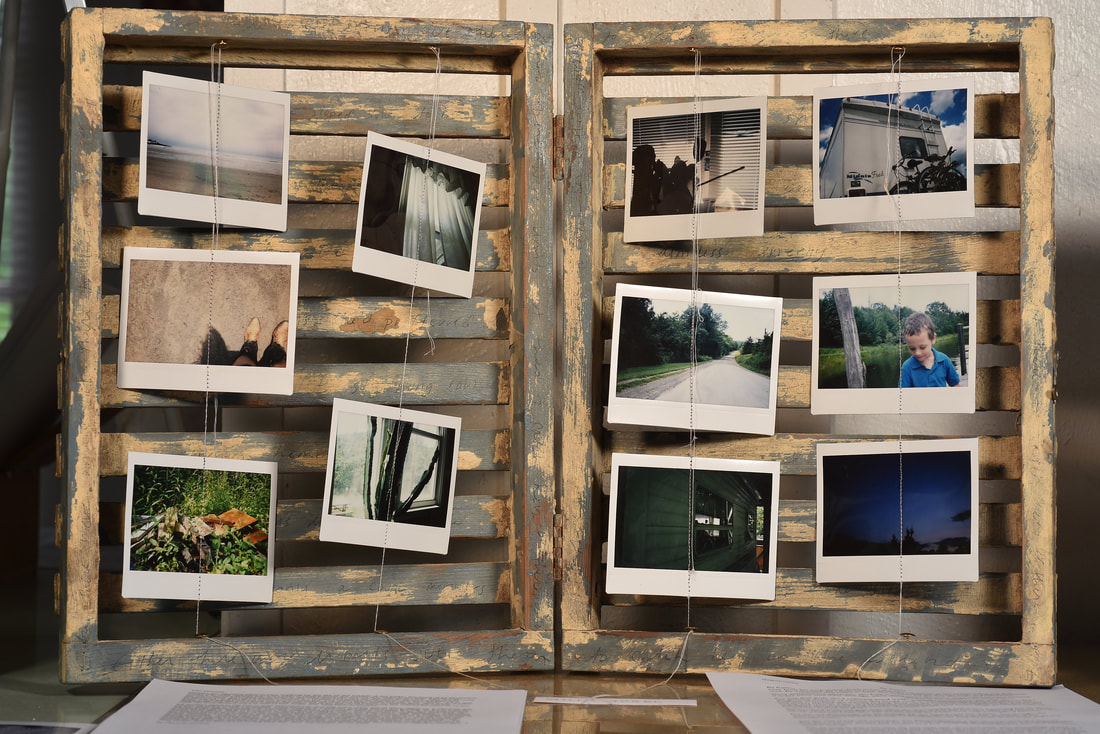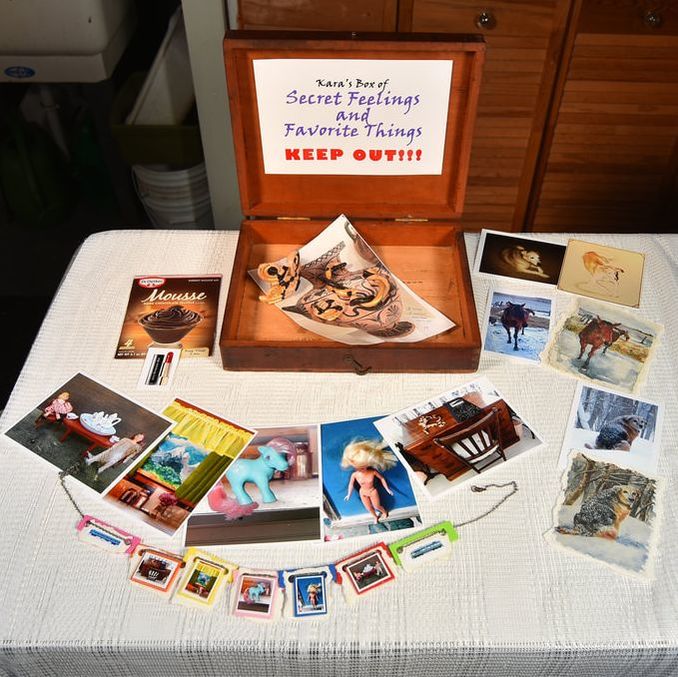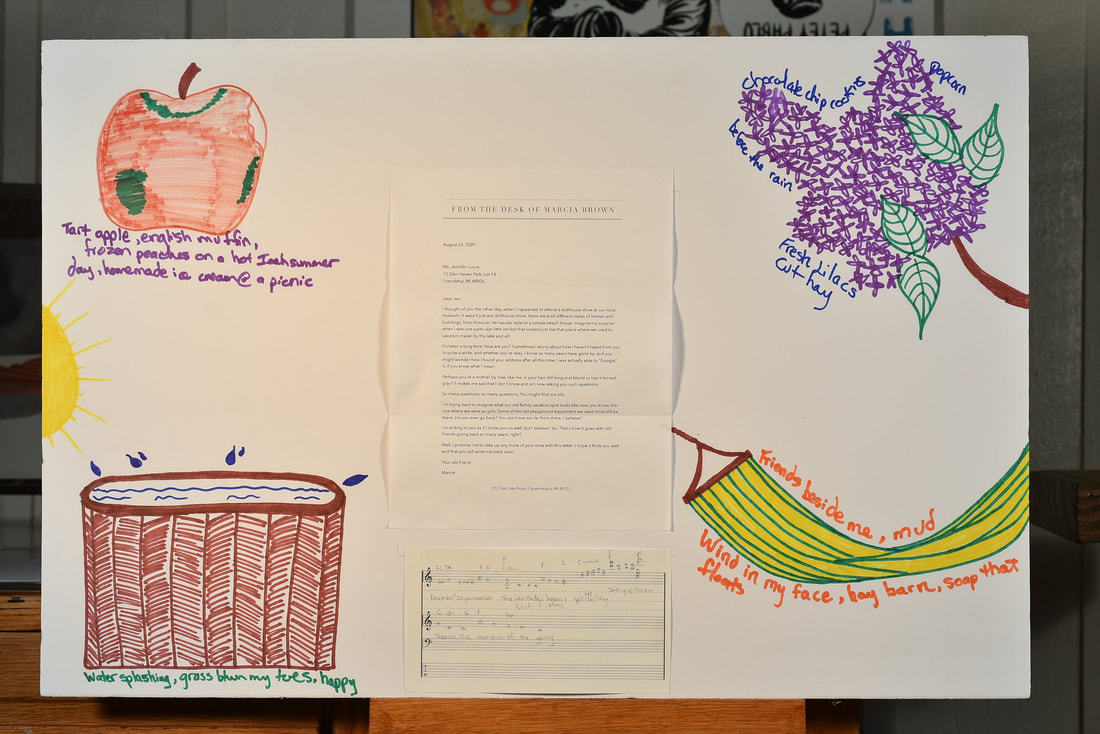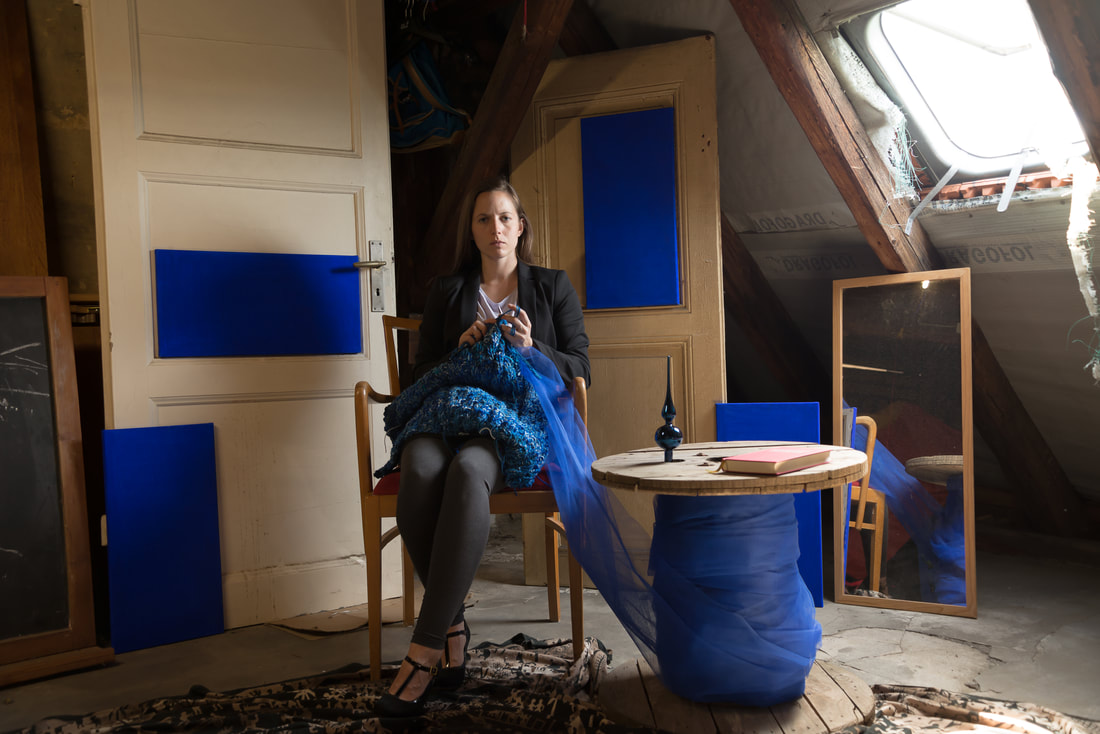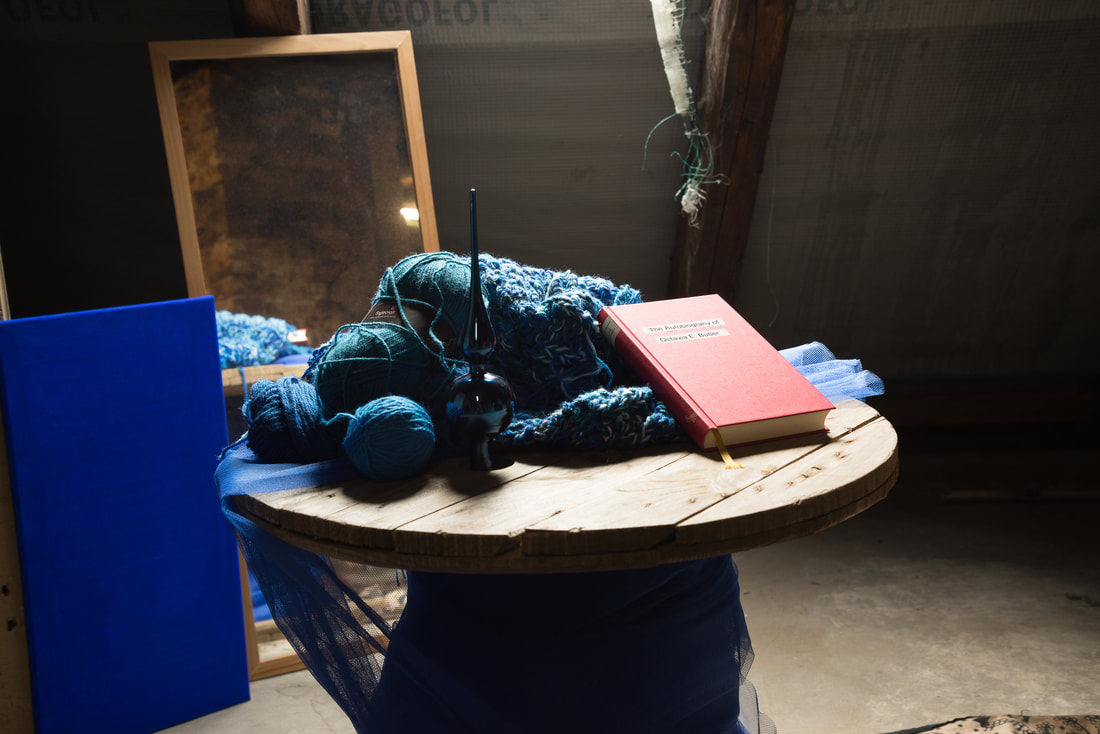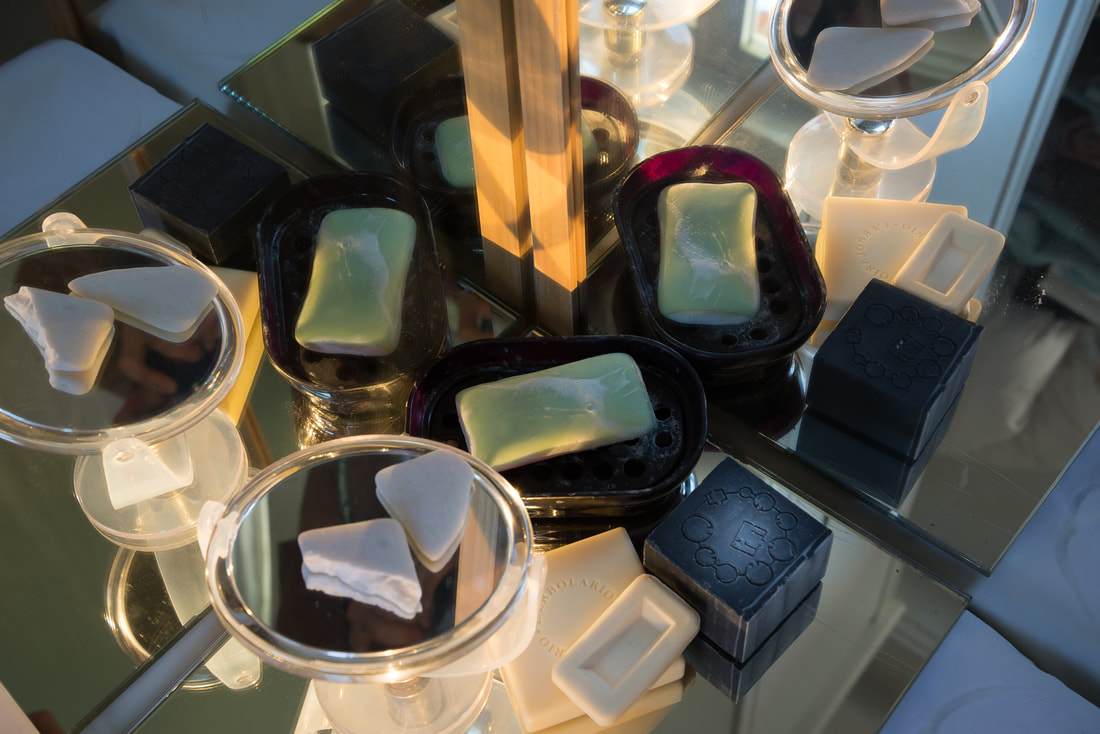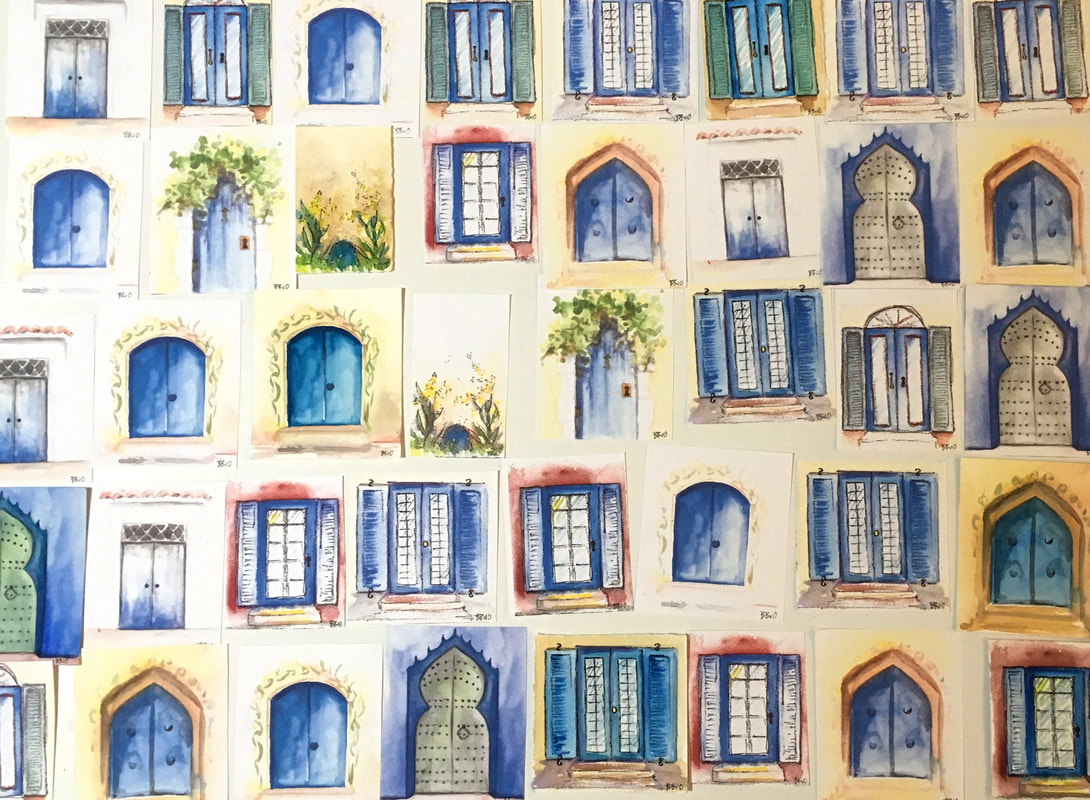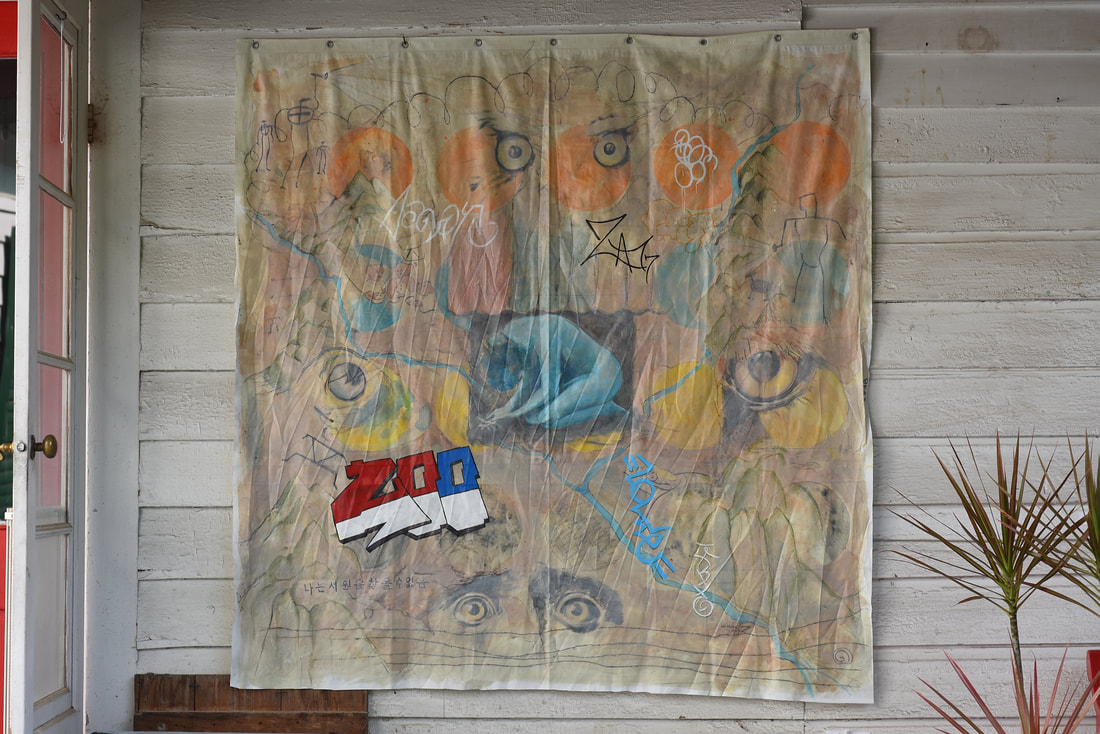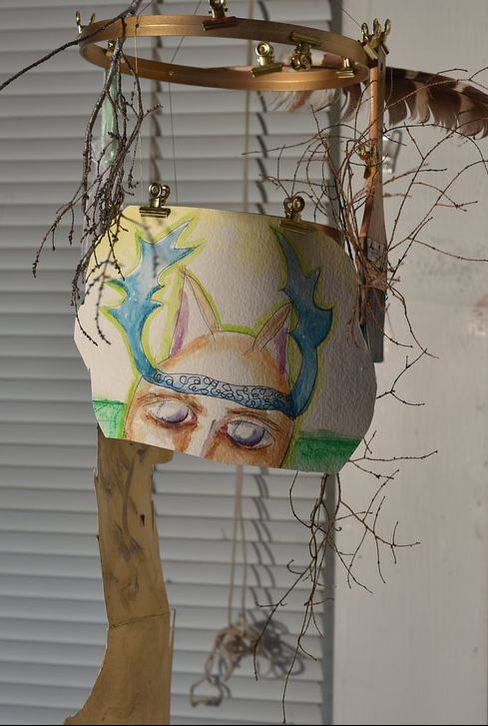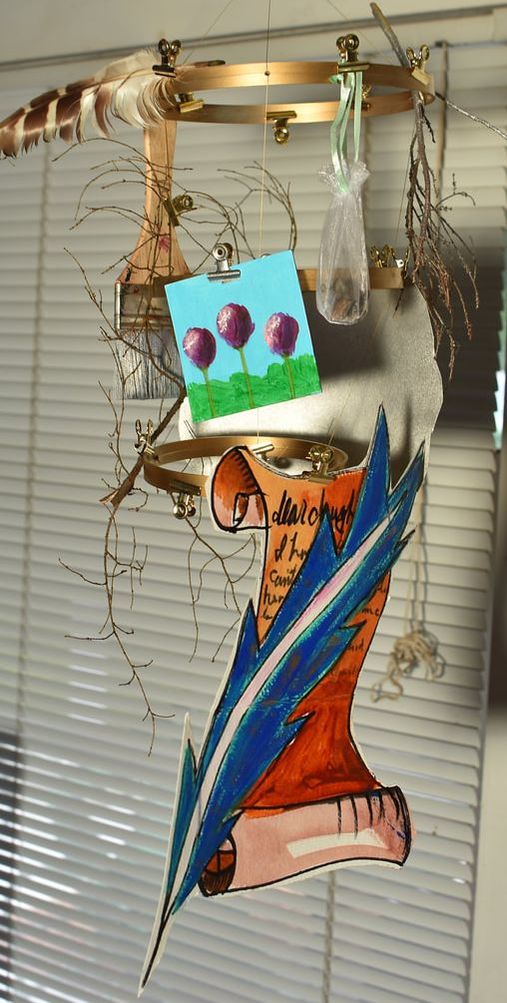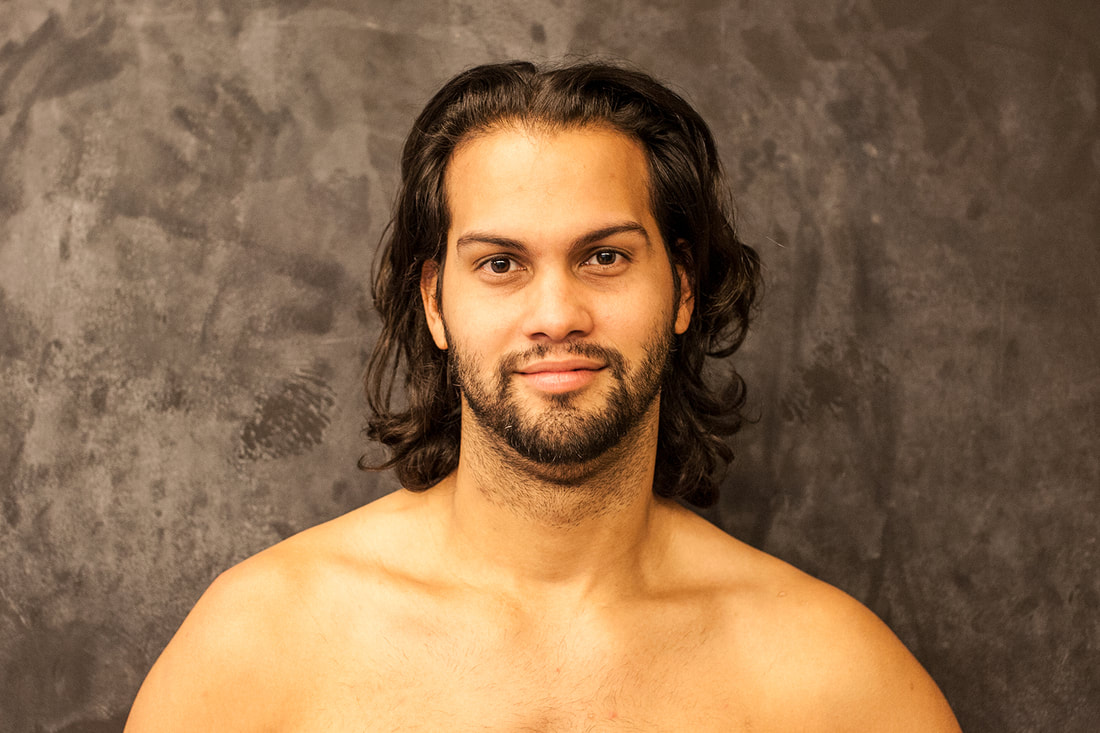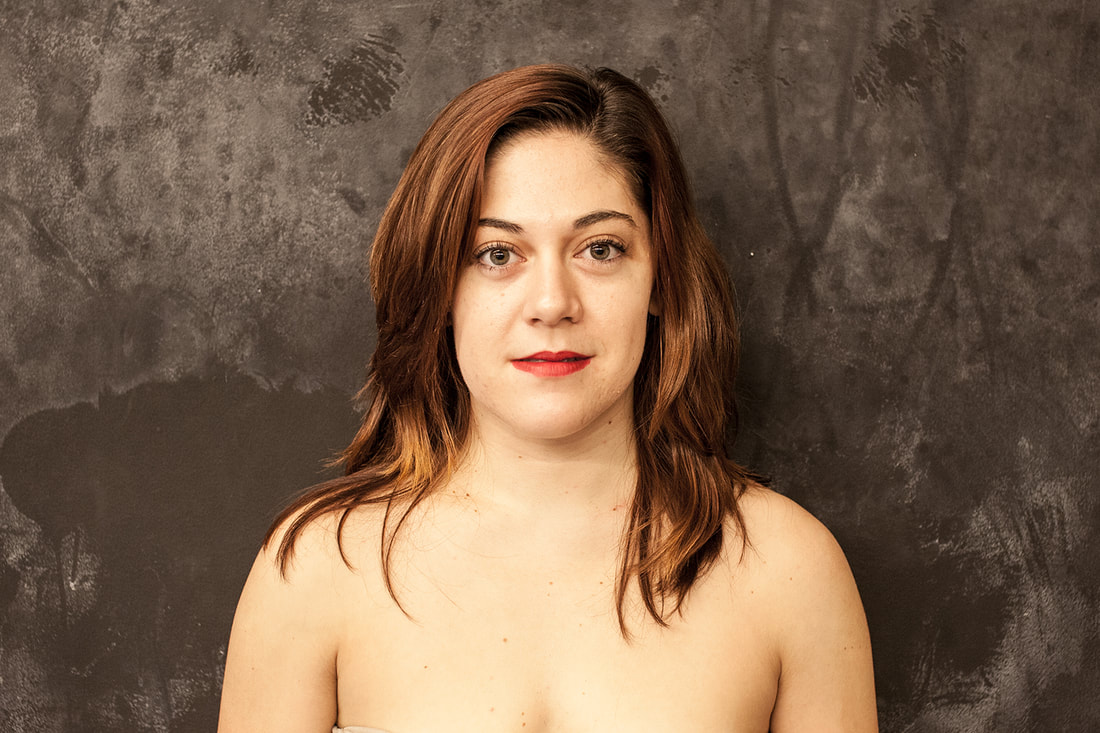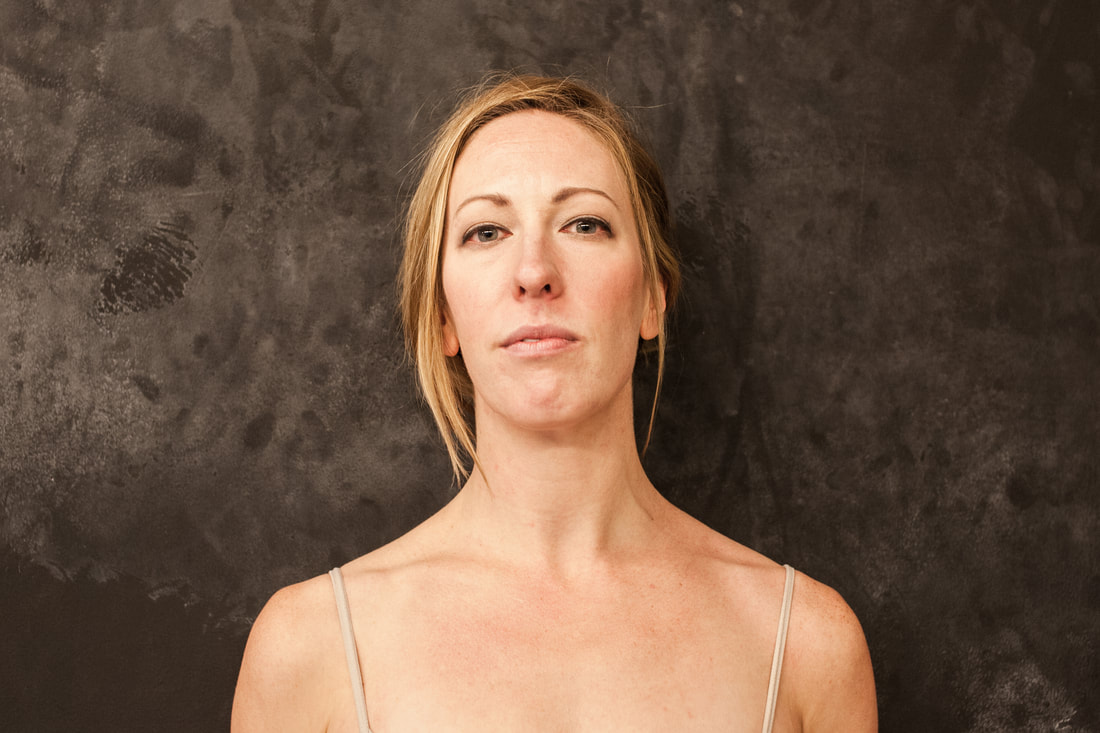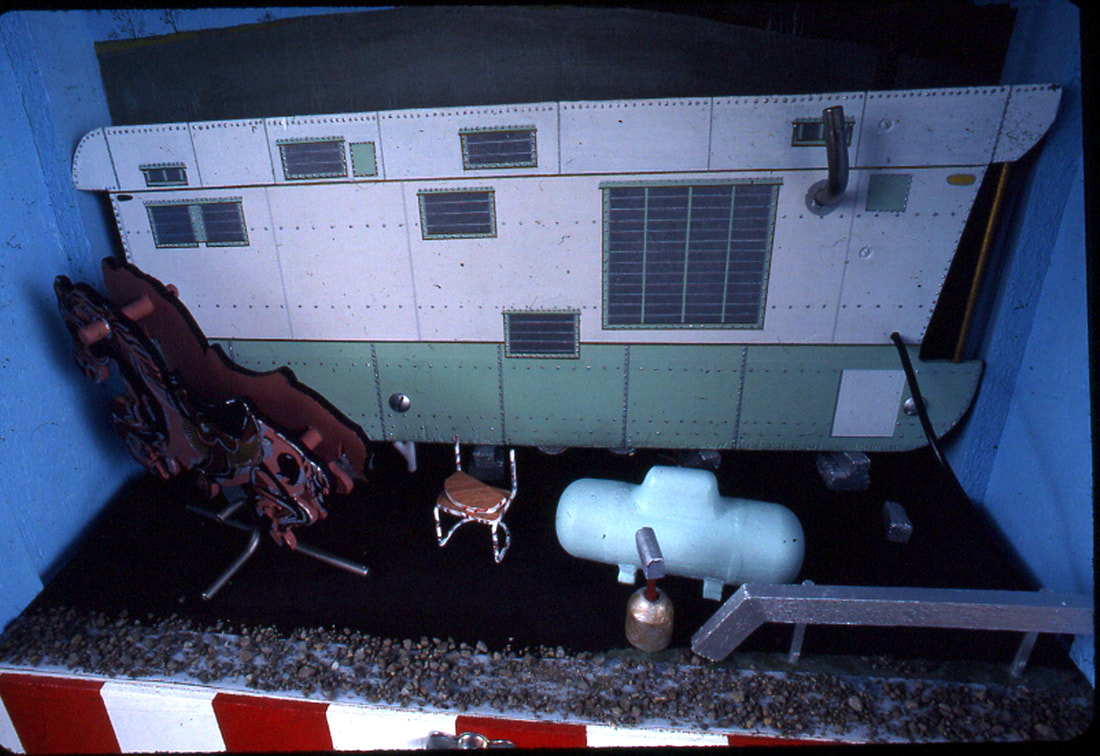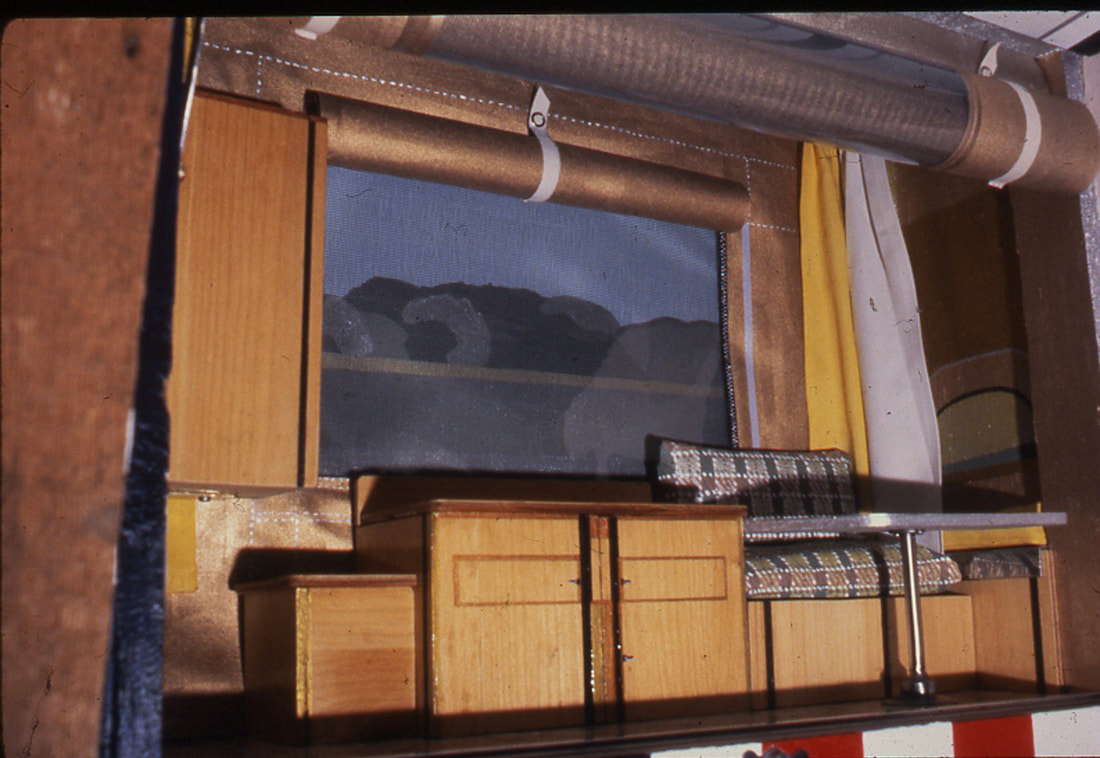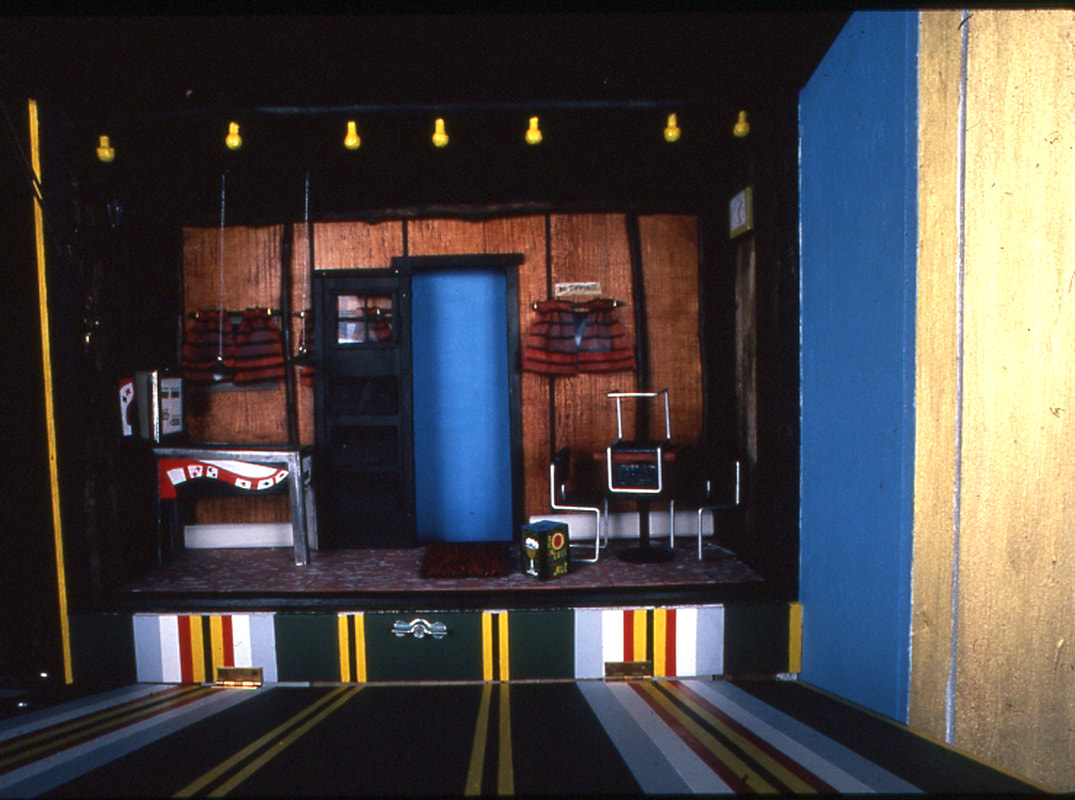|
Not Camden "But I don't know that much about art." "C'mon, April, it'll be fun, there'll be wine and cute guys. We're not going to stay all night, it's just a place to get started. Besides, I thought you wanted to try something new." The weather was nice, being her namesake month, so the heavy winter coats were gone and that was liberating. Wine was good. The vote was still out on cute guys. "Ok, I can do a glass of wine." The gallery was pretty busy, a good crowd, mostly smartly dressed, a mix of money and hipsters. April and her friend Carmella didn't look out of place, though they belonged to neither of those groups. And the wine wasn't bad at all. Of course Carmella was off as soon as her hand closed around the wineglass, chirping, "Mingle, Dearie, don't be shy, its Friday night," over her shoulder as she disappeared into the crowd. April hung back, sipping and watching. She moved around the edge of the space looking first at the people, and then eventually the art. She didn't talk to anyone. There were large abstract canvases in bright colors in one grouping, small paintings of still lifes in dark colors in another. Big photographs of nude women in hats covered another wall; April didn't look directly at the nudes, but stared out of the corner of her eye. How were these women confident enough to pose like that? In another room were ceramics in earth-toned glazes, small bronzes of animals, and dioramas of mostly urban scenes. April looked at them as she walked and sipped her wine, stopping at the dioramas: an alleyway with trash cans, the back side of a building with a dilapidated fire escape, a street corner with a mailbox. It was like a doll house city, but she never really had dolls, not the nice ones anyway. The last vignette displayed a vintage aqua and white trailer home with a curious rocking horse, a broken chair and a propane tank. Urban scenes were fairly new to her, but she had seen trailer homes many, many times before. The trailer looked a lot like Mrs. Gibson's place. The one she grew up in was almost as old, though they would never have called it "vintage." The rocking horse was made of two flat, horse shaped cutouts, decorated in the style of the old animal cracker boxes, and straddling a seat on a spring. The back of the chrome and leather chair was broken and resting on the cushion. The louvered glass windows on the trailer were remarkable in their detail. Everything was very remarkable in its detail, and very familiar. April bent over, half empty wine glass in hand, and peered into the small louvered windows of the trailer. Those kinds of windows don't keep the cold out. Or the bugs in summer. She leaned in quite close. The interior of the trailer had the same level of detail: a tiny sink with dishes in it, tiny clothes strewn about, a tiny vase with tiny dead flowers in it. On the wall was a teeny tiny framed photograph of a young man with long dark hair. Like Camden. April stood up, suddenly dizzy. She took a sip of wine and slowly bent down to the trailer again. No, the guy in the photo wasn't Camden. She stared harder but the image was so small, and it was so dark in the interior of the trailer that she couldn't see it clearly. She put her wine glass on the floor and fumbled in her bag for her phone. Finding it, she looked around. No one seemed to be watching her, so she put the camera as close to the trailer window as she dared and quickly snapped a couple pictures with the flash, grabbed her wine off the floor and retreated into a corner. She opened the photos on her phone and studied them. The images were a little out of focus and bleached by the flash, but it was definitely not Camden. He was darker, exotic looking, at least where she was from. Maybe Italian, or Hispanic? Or Indian? Had she seen enough Indian people to know? He was shirtless, but his chest wasn't visible below the collarbones. Thick, wavy black hair falling to the bare shoulders was brushed back from a broad, smooth face. Smooth skin but bearded, maybe a couple week's worth. The lips were full and chiseled and curled at the corners in the faint smile. And the eyes under long arched eyebrows were kind. Definitely not Camden. She smiled back at the face on her phone. "Who's the dude?" hummed Carmella. "Jesus! Where did you come from!" shouted April. "Chill, girl, I'm just wondering who your new boyfriend is," Carmella said, looking around. "Is he here? Am I going to meet him?" she said with a laugh. "It's nothing, just an email from work." "It's Friday night, time to stop working, are you ready for the next stop?" "Sure, let's go," April said as she jammed the phone to the bottom of her bag, and they left. April came back to the gallery in the middle of the next week. This time she was the only person in the place aside from the saleswoman. She wandered over to the trailer diorama slowly, as if it wasn't her destination. She looked into the window. The tiny photo was still there. Why wouldn't it be? She quickly left. She came back several more times in the next couple weeks. She tried taking a few more pictures with her phone. The saleswoman, Justine, caught her one time. "I, I, just wanted, uh, a picture to, eh, show my, um, boyfriend." Justine started to tell her all about the artist and his processes, but April eyed the door. "How much is it?" asked April. It worked, Justine stopped talking for a moment to find the price sheet. She was back before April could reach the exit. "This piece is a steal at $1,500." April gasped. That was as much as a real trailer. Not a nice one, to be sure. "It's only going to go up once the artist gets famous, which will be any day now." Justine looked at April carefully. April looked away. "You can buy it on time, $300 down, $100 a month and it's yours in a year." It was May now. The winter hadn't been as cold as last year. It took some doing in a small apartment, but April made the space for it, near the window. She looked at the diorama. "I can't believe a bought a goddamned trailer." She peered into the tiny louvered window at the tiny image of the gently smiling, slightly exotic, bearded young man, whose kind eyes looked back at her. "You bought a piece of art," the voice softly said. By Marshall Hyde painting by Bibi Snelderwaard Brion
**Please listen to the music below while you read this piece: composed by Ryan Hollister Small Escape
Chapter One “Pretty much everything here is free. Breakfast, lunch and even dinner, if you’re here late. Not just the food, though, stuff like pens, notebooks. Even computer peripherals. Basically the first thing everyone on my team does when they start is order a new keyboard. I’ll show you how to do that on your first day. There’s a webpage you go to where you can order pretty much anything and some guys upstairs bring it down. No cost to you at all.” Chapter Two I’m leaving home today. Mother is sitting across from me on the sofa we’ve had since as long as I can remember and, silhouetted against the dirty Chicago sunlight, I don’t feel much of anything. I’m reminded of a photograph my uncle once showed me of her as a youth in Islamabad riding a bicycle, a cigarette dangling carelessly from between two fingers of her left hand. In my lifetime that photograph is the only evidence I’ve seen to suggest that she had ever smiled. I have always envied that about her. Chapter Three The door closes behind me with a hollow whimper. It’s brand new, everything here is. The door, the counter tops, the track lights. It’s almost as if nothing had ever existed here before. Imagery of new modern ruins materialize in my brain; plantlife reclaiming the electric stove, vines dripping from the showerhead. My leather suitcases drop to the floor and I think how this gesture would have been more dramatic had it been performed just outside the threshold in the hallway, like the protagonists in films do when they’re trepidatious about their new lives. Chapter Four People are eager for me to describe my job on the rare occasion that I interact with the outside world. I struggle with this. At times I consider my job description to be ‘shedding long, black hair onto the headrest of a red upholstered chair’. It rarely matters, anyways. Mostly they just want to know what the office is like. This fortress of mystery; holed up in a cracker factory like royal squatters. Some day the peasants will eat us all. Chapter Five Everything really is free, there’s no limit to how much of any given thing you can take. I once witnessed a single man eat four large bowls of blackberries and each time the tray was empty, a cheerful man in a white chef’s coat would refill it from a fridge behind the counter. Perhaps there’s a sort of thrill being exposed to this opulence that wears off with time. I’ve started taking office supplies home with me. Post-It notes, pens, batteries. Things I don’t need. People pass in the hallway as I’m dumping fistfulls of double-A’s into my backpack and no one says a thing. Chapter Six Everyone lives here but at the same time nobody does. Chris, our project leader, suggested I get an apartment here because it is directly across from our office building. Looking out the window from my desk, I can see my apartment. It has become a sort of weird habit to stay later at work, maybe an extra hour or two, just to watch the people leave the office and walk across the street to their studio apartments. If I didn’t see it with my own eyes I would have to assume I was the sole occupant of 6480 Living Place. Walking through the hall at any given time save for before and after work, you’ll see no one. You’ll hear no one. Chapter Seven Arranged in my apartment window is a post-it collage of an 8-bit sprite from a video game I played as a child. It was an idea I stole from a tech blog. I can see it from my desk at work and a co-worker even posted a photo of it on our internal message board. The supplies all came from work, of course, but everyone seems to be heralding it as an artistic accomplishment. The large windows on the sixth floor by tech support have been gridded out for a similar group project. Chapter Eight They have begun work on a skybridge between the apartment complex and the office. Once it has been completed they will hermetically seal both buildings and we will exist only within the confines of this environment. I anticipate the announcement of the installation of a moat and drawbridge any day now. Chapter Nine Office supplies scatter across the beige carpet of my apartment as I empty the small cardboard box in a fit of anxiety. Taking up one of many Sharpie markers now displaced, this one is brown in color, I begin drawing little windows on the interior sides. With one of a half-dozen pairs of scissors from the sprawling pile I carve a door. After a few folds it even functions, more or less. I lay down an outrageous carpet of neon post-its. This feels good. Chapter Ten I break the unspoken rules of our culture as I venture out of our bubble unaccompanied by committee or group. I’ve searched the location of an arts & crafts store and embark on foot. My simple shoebox room has grown into a monstrous tower of sorts. Amazon boxes stacked atop each other, everything held together tenuously with scotch tape. As beautiful as it’s chaotic floorplan is, its asymmetry offends me. As an architect I can do better. Chapter Eleven “Did I see you walking down Forbes the other day, Amir?” She asks. I’ve never spoken more than a professional word to this woman and here she is questioning my movements. Nervously I nod, I mumble, I excuse myself. I question whether or not I should invest in a disguise. Maybe a hood, a beard I can put on when I roam the horrible streets. No; if a disguise is to be worn, it should be here in the halls of this office. I should wrap myself in an emotional hazmat suit to stave off the poisonous enquiries of these sterile monsters. Chapter Twelve A small village has sprouted from the remains of my initial effort. Perhaps not as daring as the structurally impossible tower I constructed with the scraps of corporate culture, the new dwellings are refined and understated. Single family homes pool together at the end of a cul de sac just a scale half-mile from a tiny Main Street. I, for a time, occupied a small efficiency above the coffee shop, but decided that I’d like to take up gardening and moved into a small two-bedroom home near the grocery store. My life is simple and quiet, here. I’m shielded, I am happy. Chapter Thirteen I watch the cursor flicker between white and black. Blinking in and out of existence. I can relate. Chris has asked me several times in the last month about the progress of my work and the last time he did I almost told him about the new venue that is opening up near the ‘Recliner Diner’, so named because of its proximity to the last piece of furniture remaining in my apartment. But I’m staring at a black screen with a cascade of white text, peppered heavily with parentheses and brackets. A revision history shows that it was last changed over a week ago, but it’s hard to concentrate on my inability to think in code when I’ve just thought of the perfect wallpaper pattern for the venue’s walls. Chapter Fourteen RE: BIRDFEEDER ATTRACTING PESTS Rather than employing a potentially hazardous poison in the courtyard area, I’ve taken the environmental initiative of deploying have-a-heart traps near the bird feeder to catch squirrels who are lured to our green space by the abundance of seed. I enjoy watching the birds from my windows, both at work and at home, and would rather put in the extra effort than see it vanish. I was, however, thinking it might be fun to start a sort of catch and release club. I’ll be transporting the squirrels to Frick Park as needed and would enjoy the company of other hikers as we introduce the animals to their new habitat. Anyone interested? Happy Friday! Chelsea O. Chapter Fifteen As of right now, no one has noticed the diminishing. Rather, no one has mentioned it to me. I can’t imagine the change will be visibly noticeable to the office staff for another week or two, at the very least. During this period it is my intent to furnish as much of Centerville as possible. Crudely fashioned living room sets made of scrap fabric and thick-gauge wire are being replaced. Using models I found on an open source repository I’ve been employing the office 3D printer to craft various chairs, televisions, refrigerators and the like all in garish primary colored plastics. Adam, in the seventh floor micro-kitchen, is talking to Kathleen about how the printer has been booked unfairly for days. “Must be a new hire.” She says, stirring honey into her Icelandic yogurt. “ They get so excited about it when they first start, but within a week the novelty wears off.” Chapter Sixteen The most difficult part of the process has been the effect my smaller hands have had on my ability to type. It’s not impossible, rather, just clumsy. Slower. Tiny, fresh fingers lack the same reach and I often end up hitting the ‘k’ where I’d meant to hit the ‘l’. Ironically I’ve found a renewed passion for my work, as I anticipate it to be my last opportunity to practice my career. It’s funny, as with life itself, once a finite deadline has been set you tend to cherish each day with a careless and precious handling of every insignificant moment. Chapter Seventeen Disaster. Perhaps I have exceeded my talents, but the functional model street lights I had wired around the town square intersection caught fire and damaged the clock tower -- the central and defining landmark of Centerville. While the damage is not insurmountable, it did bring into focus the fact that I neglected to furnish the city with proper emergency services. It has been twelve days since the diminishing began and I’m not entirely certain I will have enough time to establish the proper services. Chapter Eighteen I have stopped going to work altogether. My size has rendered me, by comparison, a comical facsimile of a human being. Feigning an illness, it did not matter which, I have excused myself from the office for an indeterminate period of time. I do not intend to return, but, in the event that my diminishing takes longer than anticipated, I would prefer to maintain the income. I am still able to submit work, though it is not expected of me during my sick leave. Chapter Nineteen “Mother, this is Amir calling from my new apartment. I’m aware that it is late…” I pause, considering whether or not this is a necessary phone call; whether or not this is a goodbye. “Mother, I remember when I was young - not my first memory of you, but I was young - I looked into your sienna eyes. I could see, there, the latticework of mortar, strong and fresh. That wall spanned the infinite length of your iris, it held your world complete. While, in a sense, I have never truly known you, this is the most important thing you’ve ever taught me. We’re all architects in our own way; you and Jalna and I.” As I chew the truth of my prepared closing statement the phone interrupts my reflections, asking if I need more time. I press the number key indicating that I do not, and hang up. Chapter Twenty Still too large to go inside any of the buildings, I am now able to walk the streets of my creation with some sense of regularity. I have spent the better part of the day opening doors, testing benches for structural integrity, matching my might against the walls of various buildings. While, mentally, I had lived in many of these houses, being here among them as a resident left me feeling rather out of sorts with my creations. The dream home I had spent the most time building now seems to belong to some stranger. Laying on a park bench, the tiny ridges of the printed plastic cut into my back and shoulders and it occurs to me that I am still falling asleep staring at the same ceiling. by Fredrick R. Arnold III Michael Callahan hadn’t spent too much time figuring out what to do when he grew up. Why should he have? It made more sense to live day to day. How does anybody decide what to do with themselves? The canning factory closed in 2008 after the economy hit, so Michael was then out of his third job in a row. Time to give up? Not having anywhere in particular to be makes time go by fast and slow all at once. Have you ever tried it? Not just for a weekend, but a long stretch of time, weeks, months. TV gets dull. Really really dull. Michael found that even shows he would have called his favorite a year before had lost all their charm. Daytime court shows are straight insipid. Is there even any good TV anymore? He tried all kinds of sleep routines. Nocturnal like a raccoon, check. Are you familiar with polyphasic sleep? Did that. Sleeping sunset to sunrise. That one's better than you think. At this point, you're wondering how he survived, financially. Newton was a low-cost town. He got an unemployment check and completed the bare minimum to keep that up. His parents, a mile and a half from his spot, weren't willing to feed him dinner every night. But do you think they'd let him starve? No, of course not. And he wasn't 100% without work. The odd job came to him. That's why they're called odd, you know? Michael was surprised to find he liked house painting. It's boring, not particularly hard. It was all a paradox. A lot of decisions about doing nothing. Why bother showering? When should he make lunch? How much beer was too much for one evening? Whom should he call to hang out? What did he want to be doing, a week from now, a month from then, a year out? Is it okay to stay home for three straight days? How does anybody decide what to do with themselves? Would life be different if he won the lottery? (Should he play the lottery?) Do most people in his situation plan or just go with the flow? What are you doing today that matters for your tomorrow versus your next year? How do you be the best version of yourself in the worst situation? How much have you figured out? Are you prepared for changes? Are you prepared for no changes? By Neil Bardhan photograph by Gretchen Halpert
She thought she got it, too. Hands shaking with excitement, the spoon rattling against the teacup in her hands, Staci recounted every second of the oddest audition of her career to her roommate. Her skin flushed from the cocktail of adrenaline and August heat, but she couldn’t sit still or even stop to take a sip. There was too much to say. Charlotte eyes widened. “And you said yes?” “I had to. You know how many times I’ve gone in for roles I was made for, and all I left with was a half-hearted handshake?” Staci’s eyes glimmered. Yes, the director had seemed more than odd, if not downright creepy, and the low-budget film set, in a dingy warehouse pier, didn’t fill her mind with confidence that this project would be her stepping-stone to stardom. Still, there was a stirring inside of her. She’d opened the grimy warehouse door, at once desperately hoping she had the right place and desperately hoping she didn’t, to find the familiar buzz of theatre activity already underway. The costumer makers huddled and murmured in one corner, squinting and shaking their heads over reams of avocado green and creamsicle orange fabrics. The set designer paced the stage, alternately placing the cheap metal chair upside-down on the little wooden bar table and then removing it again on an endless loop. Green, purple, blue and red lights flashed on and then off, marionettes of the tech crew. “STOP PLEASING OTHERS, ANGELA!” He was in front of her suddenly, screaming so violently the veins in his neck visibly quivered, his eyes bulging and throbbing with rage. “You are only on this ride once. Are you going to waste it on rodents who don’t even care you exist? Do YOU even care you exist?” “I’m… I’m…” The spittle from the insult flecked her face. In her shock, it took her moments to realize he was delivering lines from the play, so disorienting was his attack. She had a sudden awareness that all eyes in the tacky, makeshift studio had turned towards them. Without time to discern anything more and with all her faculties having return to her, she leapt. “You wouldn’t know the first thing about the cost of trying to make it in this place, Frank! This wasn’t handed to me! You...you were born into this! Daddy made sure of it!” She looked down, briefly, then a back up again, leveling an icy glare on the man. “Perhaps...” She paused, for a moment, while her right hand reached inside the shiny black bag dangling at her waist. “...this ride needs one less passenger.” By Viva & Matt McCluskey dramatic reading (at the June event) by Suzanne Schapira
How is that we come to have a body? I mean is that your body? I mean do you own it? Is it you? I always thought I’d be the kind of person to age gracefully, that didn’t slouch, that grew a big beard and learned how to fish. And yet hear I am aging, I don’t know how to fish, I slouch, but luckily I can grow a big beard but I think that’s even hit it’s max. I like rooms, I think you do too. I like to be in a nice room, to have a nice drink while sitting on a nice couch. I like to think there might be kids around, maybe not mine, but a friend there who’s got his or her kids. I want to be in a nice room and I want to be optimistic. But then there’s this thing with having a body. It receives pleasure from nice things and it smiles when it’s getting this reception. And that’s what the body should be feeling, right? While in a nice room? But what if it feels pain? I don’t mean my leg hurts from a long day or long run or bumping into a table. I mean what if the pain can’t be explained? What if it won’t go away? What if it’s always right there with you? And I don’t mean emotional pain, although I certainly could, I mean the physical reception that something is off internally that your body let’s you know it feels. I’ve been trying to think of a description for it. And really it’s like an out of body experience, like you’re standing there or sitting there and you feel naked and you can see yourself, see what you think you look like and what you want to see is a person at peace, at ease, but what you see instead is like a strange reflection of your body in a position of discomfort and then you really do want to get out of your body but you can’t. It’s like being locked in a room. And you look around at the room and you think about how nice of a place it’s been, of all the pleasure you’re received and maybe given there, but suddenly you want to get out of it. You look at the door and you start to imagine that if you walk out of the room the pain will go away. And so you go ahead and walk out and stand in another room. But the pain is still there. And you start to think about all the pleasures you’ve felt in your life and how’s it probably a pretty good life, I mean you do read the news and you do know people whose life isn’t so good and you think that all things considered, yours is. But then you stop thinking for just a second, maybe even less, and you start to feel the pain again. And so you walk out of that room into another room all the while imagining, trying to will into being the absence of the pain as you walk through the doorway. One step, two steps, and then you get through the frame and into another room and it’s still there. So you go ahead and walk out of the house and keep walking, down the street, around the block, across the street, and down another block, and then down another. And you think that if you can just keep walking the pain will stop, you’ll walk it away. And so you go. For an hour, maybe two and you start to think you’re doing pretty good, you’ve got this thing taken care of and so you stop. And there it is. You can’t will it away and it’s like the whole world has become a room in which you live with your pain. And if you’ve got to have it well then you want metaphors to give it a name for after it passes. And you really want to think it’ll pass. And then one morning you wake up after having fallen asleep feeling a numbness which the pain becomes at night, and it has. It has passed. I want to know that it does and it has and I’m not feeling it now, but that while it’s there it’s like the whole world is a room. What this gets me too is that as I age I’ve had to come to a different agreement with myself about my relationship to pleasure. How not feeling pain is a form of pleasure. How what I thought would never happen to me has happened to me. I mean, do I own this body? Do I own this pain? Could I sell it? I see a picture and I want to tell you a story. I used to do this. I’d go into a thrift store and buy ten photos for a dime and write a short story about them, put the pieces together, make something up. But now I see a picture and when I start to think about what it is I’m imagining, I start to imagine pleasure. But then I start to imagine pain. Has this person felt this before? Did he sit in a nice room with his shirt smiling at a lover anticipating the pleasure that goes along with the upcoming events and suddenly get cut short by pain? I doubt it. I really do. And so this gets me back to my question: how is it that we come to have a body? Whenever I don’t know what to write and I do want to write, or even if I’m lonely and need to think through something, I imagine writing to someone. In this case it’s you, whoever you are. Why don’t you imagine we’re friends, that we’ve gone on a road trip together, that we’ve sat on a beach and thought about kissing one another but held off for one reason or another. Don’t worry about gender, or age, or color: let’s just imagine that we care about each other. And that we go long periods of time without seeing each other, but still write letters or at least emails letting one another know what we’ve been up to. And this is where the body comes back in, this longing. With pain comes memory. And with pain comes realization. Sometimes what feels best in life is to want someone, to feel you can be satisfied in this desire. Does it fade over time? This wanting to want? I suppose so. But does it ever go away? If I know nothing else, I know that I don’t want it to. Whenever I see a body now, any body, instead of thinking about all the pain it’s experienced, I try to think about the pleasure. How sometimes you can just read it on someone’s face. A smile, or the way a woman brushes her hair off her forehead, or a man lights up when he sees a friend. I could go on and on, but this is a short poem so I won’t. I’m just sitting here in my body thinking about other people, about how I’d like to spend time with them, go for a nice hike or spend the day at a lake and I can’t help but think about their bodies. How I used to be one of those people that we would say “I’m not my body, this thing here is just a vessel, and you’re not your body either.” I really wanted to believe that, but I can’t, not now and certainly not because I can see the differences between the bodies we’re in. I do think it’s important for you to remember that I want this to be about pleasure, that this is a poem about pleasure, or this is a monologue about pleasure. Someone is smiling, happy to be here. I want to tell you about a movie, I want to ask did you see that one about…waking up on a ship in space not sure what year it is, not sure if it’s even you that went to sleep. It’s like a metaphor for the body too, how sometimes you don’t even know how time works, you just wake up and bam, here you are. And I want to think about another movie I’ve seen recently that I can tell you about, or a book, but…well, it seems they all have to do with the body, or at least someone’s body. Even a book about a lake is a story about the body, about a living organism, I mean just think about the Dead Sea for a minute. And so when I see a room now, I think about the body in it too. It was built by bodies for bodies to be in, to be sheltered, to be at ease, to be in love, to experience pleasure. Look at the couch, what an invention! It’s like a bed, but for sitting on with someone else, comfortably. by Christopher Ashby music by Maxwell Harvey-Sampson
Finite Disorientation He is better than you, he is grand. His fingers work at the speed of light And he can craft in darkness. The strands on his head move deliberately, effortlessly iridescent. He is better than you, he is grand. His constructions fit stadiums inside stadiums inside stadiums. He plants dreams right into the ground, and he can levitate a horse. He can shave just by thinking about it. He is better than you, he is grand. Those large feet face gravity everyday like loyal soldiers. But he stumbles looking up. And his chair broke and is so small. By Reva Eiferman narration & film by Mark Fred Hibbard
Step right up Step right up Right into a real life artist Exposed for all to see Skin Sheets Everything vulnerable has a price Don't bother with clothes, doors, walls We'll find a way in anyway We always do Everything vulnerable has a way in Step right up Step right up By Alex Sovronsky music written & performed by Lou Vogel
“Did you get the money!” “Yeah, I got it.” “No, shut up. Shut up, Luscious. You’re not listening to me. Did you get the money?” “Yeah, I got the money.” Chuck slapped Luscious so hard his dark flowing locks covered his face. “Hey, man..” Luscious moped, rubbing his cheek. “No. Shh. Just shush.” “You hit me.” “Shut up, Luscious. Just shut your hairy face for one second.” Chuck massaged his chin. “So you got the money.” “Jesus, I got the money!” Chuck slapped Luscious across the face again. He grabbed him by his shirt collar and pulled him close. “But the vig! What about the vig, Luscious? Did you even think about the vig?” “Oh sh -- ” “Of course you didn’t!” Chuck let him loose, turned, and slammed his hands down on the poker pinball machine when a little ditty started to play and lights turned on circling around the word JACKPOT. “I knew I couldn’t trust you. I knew you’d just go and screw this up for me.” “You didn’t tell me about any vig.” Chuck spun around, poking Luscious in the chest and knocking him back. “I didn’t think I needed to, Luscious! It’s pretty common sense you need to account for the friggin’ vig! Everybody knows that. And now we’ve got to make amends. Now I’ve gotta go the extra mile, which is something I didn’t want to have to do, but, because of you and your stupidity, now I have to. All because you don’t have any common sense. So...” Chuck reached around Luscious and grabbed a pair of scissors off the table, “Now this is happening. Give me your hair.” “What? No!” “Give me your hair, Luscious.” “Wh-Why?” “I’m going to sell it.” “Nobody’s going to buy my hair.” “Luscious, you’re hair is amazing. It’s practically glowing. It’s like the mane of stallion if the stallion was birthed by a unicorn. And I know about hair. I never told you this, but I used to be a hair merchant. Hair hawkers they called us. And, Luscious, I was good. Real good. With me and your hair, I can get us what we need. Probably a little extra.” Luscious took a step back. “You’re not cutting off my hair!” “Well, then Petey Pablo will. Along with the rest of your body.” “Petey Pablo? Isn’t he a rapper?” “Not anymore, Luscious, now he’s a bookie and he’s the worst of all the bookies. Of all the bookies that’s ever existed, he’s the worst. He takes the cake. And you better believe he knows what a friggin’ vig is, Luscious. So, not to oversimplify it, but, you know, I think cutting your hair is, like, the least you could do for putting us in this situation. Besides, it’s not like your modeling career is ever going to take off.” “Well if you’re so good at this thing then how come you left it all to me, huh? You’re so knowledgable about all this stuff, how come you left me, a rookie, to take care of all this? I think you need to take some of the blame for this too, Chuck. Not be such a goon.” “I left it to you, Luscious, because you were the one that wanted to make a little money, pay off your debt from this poophouse.” “It’s not a poophouse!” “Look at this place! The floors a mess. The walls are dated. I mean, you’ve got dishrags hanging over your damn windows. Hell, you’ve only got one table. One table, Luscious! How the hell did you ever think you’d make any money with only one friggin’ table! Maybe stop worrying about your hair and start thinking about how terrible you are as a business owner.” “You know what, fine! Cut my hair. Sell it or whatever it is you gotta do with it. I don’t care! Let’s just pay him off and get this over with so I don’t have to deal with you anymore.” “Sounds good to me,” Chuck said, pulling Luscious’ hair back and hacking it off in the most ridiculous manner, one couldn’t even fathom to describe through prose, all while whistling. “All right.” Luscious grabbed the hair out of Chuck’s hand and darted through the door. “Let’s get this over with.” illustration by Marshall Hyde
Hana, man, mona, mike; Barcelona, bona, strike; Hare, ware, frown, vanac; Harrico, warico, we wo, wac. I fell backwards from my fragile chair, not unusual for me, I fix things for a living so at home I like the freedom of disordered and broken things, I find comfort in it. I was never the goose on the playground, always the duck... like the kind of duck you see in the window of a Chinese deli in San Francisco hanging amongst brothers, it's not sad, each one is waiting to be freed from the hook, ready to become the antagonistic goose. As I lay there on my back looking up at the corrugated metallic horizon of my home It occurs to me... a tiger won't holler and a duck is no match for a goose. My story isn't sad, it's not even a story so much as a thought or the feeling you have when you play with your sibling jumping from chair to couch to chair, feet never touching the ground. You know all along that the lava makes it fun, you know that you can open the heat register and free your mini-figs from lego jail, you know that paper and scissor will never be a match for rock. I put the ashes in my pockets instead of the posies, my chair isn't broken because we all fall down. by Whitney Menzel video & choreography by Kristen Merritt
In Motion Monologue I can’t remember for the life of me, the last time I stayed put. By the time I was 10, I’d lived in 5 different homes. Seemingly nomad-like, I grew accustomed to a life of being on the move. Laying foundations one moment then uprooting the next. By the time I was 15, I’d become agitated if we’d been in one place for more than 2 years. Like an allergic reaction, I’d itch and get anxious and feel the walls closing in on me. It also didn’t help when Mum and Dad were racing up and down the stairs hollering at each other. Hollering? I put that lightly. More like full on screaming matches followed by objects hurtling through the air. I became so numb to it like background noise – a soundtrack to life per say. As long as I wasn’t directly involved, it wasn’t my problem. Having said that, it was inevitable that I’d become a direct target of my mother’s accusations and abuse especially when Dad had enough and crashed at my uncle’s place for 6 months straight before getting his own place. To say that period in life was a dark time is an understatement. It was perpetual, agonizing and plain confusing. Brainwashing is no joke and once you’ve reached the point where high school feels like the best 8 hour escape of your life per week, you really start to lose grip of what true joy is and start to question if you really are worthy of happiness. Fast forward 10 years, I’d somehow managed to climb up with hands on work experience, sorted myself a decent job with good pay, rented out a great apartment and had not spoken or seen my mother in 8 years by this point. I remember having nightmares and being flooded with guilt about not being able to withstand the physical beatings. I often told myself I’d chickened out. It just hurt too much both mentally and externally. There’s so much battering and bruising your psyche can take. You naturally burst and have enough. So, I left…just like that. I can say I’ve tasted momentary freedom a couple times to say the least. While naturally fleeting, there’s always a crash. Without guidance, the concept of freedom transcends into repression. Suddenly, you look around and see solid communities and friend’s families looking at you funny because you’re used to serving yourself first and putting others second. You are the only thing that matters to yourself – to keep surviving. Out of the rotating partners, fair weather friendships and hazy nights under the influence, the one thing I couldn’t shake off was not being able to stay put. I knew once the agitation and itching set in, it meant having to uproot yet again. I’ll never know where I’m heading in those moments but one thing I know for sure is to keep moving. By: Karina Curlewis performed by Ashley Wilson
Notes from a Safe House
by Douglas Milliken photo installation by Vivian Hua
individual photos: Chilly! Not so much as to cause discomfort, just annoyance. The neon sign is aglow, slowly purring a slight hum with it's cold cathode-tube-gas-discharge. I really wish there were chairs in here, but it's just me alone and not quite dressed wearing simply, well, matte red lipstick for whatever reason and with my back a few inches from the weathered wall behind me. The moments leading up to this are inaccessible from my memory banks, a lapse. Nothing outright scary, just adequately fuzzed over. Nonlinear time, partitioned by memory that is sorted in order of importance by some internal arbitrator of neurological hierarchy-access denied. My memory is generally pretty sharp, although year to year it seems to be less dependable. This however is an unusual, pointed lapse, 'scene deleted.' The floor has a garish mesh of stripes rolling back in a mildew-stained carpeting most likely left over from the seventies. The stage is a tavern setting, empty of actors but betraying signs of recent use. This whole setting feels important, as if I am supposed to divine meaning from it somehow, or else the performers all left already? A generic antique pinball machine, probably all flippers and bumpers and pre-multiball era perhaps, sits underappreciated in the corner, faintly whirring. Chairs have been halfheartedly turned upside down on the table and an empty liquor box is left on the floor beside them, either absentmindedly or with little passion by the bar staff. A centered door unapologetically ajar traces a rectangular void of blue outside its threshold. The houselights are on in this venue, and a droll static buzz is oscillating faintly enough to forget and then tune into and then forget again all in the same train of thought. (oh yes, the neon light) The funniest thing about this door is that you can hear the-feel the-abyss of cacophony of the outside world funneling through, and yet all that is visible is flat blue light that squint as you might doesn't seem to come into focus. There is no pit for an orchestra, no balcony. I've been here now for long enough to question just how long it actually has been, just long enough to be curious if there is a formal start or end to this experience. I don't remember entering this theater, or purchasing a ticket, or sitting in my kitchen looking in the weekly declaring out loud that this seemed a good way to spend the evening, or morning, or whatever this increment on the chronometer could be interpreted as. I'm staring disembodied at myself staring at the stripes on the wall. At the pinball machine. At the ambiguous blue bright vacuum. The seemingly arbitrary placement of the boxes that may or may not contain boozy items. I wonder out of the blue what song I would choose as the title music for the end credit sequence of my life. Not sure if I tried to leap through the door if it would be allowable, and here I seem to be paralyzed in an observational assignment, stuck in anticipation of what this all means. It could all be smoke and mirrors in any case. Flats and stagehands, etc. An outlandish speakeasy? There are times when I'm laying in bed trying to fall asleep when a laziness takes hold and I plan over and over potential different ways of shifting from one side of my body to the other, and nothing seems to be the right solution. I lay and mull the options of muscle movement over and over, cycle them as if rinsing my mouth with the thoughts until there's hardly anything left at all to spit out. My stillness in this “theater” feels similar, suspiciously dreamlike and yet so sharply coherent that it seems out of the question. The blue rectangular void starts to emit a sound close to distant birds and possibly a thin ribbon of morning commuter traffic erratically shuffling along a highway? It should be noted that the floor is painted like the stripes of a Pendleton blanket, or thick long model paint along a vintage soapbox derby race-car. My feet are cold and seem faraway looking back at me from hibernation. I'm losing my patience, and can now hear the loudening open space and faraway sirens and erratic metal grinding of garbage trucks (it isn't trash day today, is it?) Let's get on with this, really. By Morgan Hobart installation with blown glass cup (featured at event) by Dan Mirer
Made in a Trailer Park I remember the broken years you lived in that rumpled land submarine someone else had run aground at the park behind the drive-in. The faded green trim. The once upon a time white, a wind-buffed shade of bone. I remember how we would make up stories of all the lives given to it, lost to it, as if that dented trailer were a ship night-mangled on a reef of failed dreams, again and again, over the years before you and your mom pieced it together for your own doomed voyage, which seemed destined to leave you stranded there. I remember the way your mom rigged up that shower out back. Those three shivery buckets. The way you squealed from the cold, even in summertime. I remember the way she would rinse between double features. The glow from the giant screen filtered through the two small windows of your home, brightening her shoulders as if she did have stardust, as if she might have been a washed up, washed out, shooting star. I remember all those movies. The hollow sound of the tin roof beneath our feet as if the world might swallow us whole. The day that hail storm pinned you down for hours, as if trying to break through, trying to break you. I remember how you swore you’d get out. You’d wash your hands of that place, of that life. Here it is all these years later, someone else catching sight of you from that not quite collapsed abode. A girl, maybe, on the one-eared rocking horse you left behind, corralled in the stony yard. A mom, or dad, or aunt, maybe, looking up from a feeble kitchen chair plunked by the new water hookup, watching your massive face, that long ago ache in your eyes something you have turned to gold. No one even noticing the rotted corner of the big screen. Peeling layers of paint. All they see is the tear you have trained to run down your right cheek. As if you have channeled some part of you that never got out, that never truly got away. by Lafayette Wattles Video by Meg Willing
By Texas By Kansas, her neck sloped down to her shoulders as gently as the prairie rolled out and away from the road. By Oklahoma, her heart was a plateau she was ready to push everything over. By Texas her skin began to peel. She stopped for gas and almonds and sunscreen. She’d wanted it her whole life. She built it once when she was a child, and had been revising it in her mind until three days ago, when she signed over her Tercel as down payment. For that first draft, she’d collected wood scraps from the construction site next door – from the growing skeleton of a house that would soon harbor the freckled shit-wad who would publicize everything she wanted to keep from view, so that her life became a series of deeper and deeper retreats. Then, in a Dumpster behind the JoAnn’s, she found scraps of linen and burlap and vinyl that she used to cover the miniature windows, to upholster the tiny bench seat where she dreamed a real version of herself would read books while mountains rose up behind her, behind the glass. Always, she’d preferred gray days when the sky hung low and heavy, hemming her in. When she was twelve and needed x-rays of her mouth, they’d lain her on a table and spread a heavy smock across her body. She was disappointed the x-rays took only a couple of minutes. For the real Winnebago, an ’06 Voyage 34, she signed over her Tercel, and thought the chances were fifty-fifty that Jeremy would take care of the monthly payments as the statements arrived in the mail, until he heard from her. Did the hope in his brain make her love him more? The gas was cheap, the sunscreen was Banana Boat, and the almonds were dry-roasted. The boy who took her money had the same indestructability of her own son; she would have hated him before she became mother to a boy. Now all she had was her love and this other, aimless energy. The air outside was cool. The sky was wide and open and pink. The Winnebago ticked as it cooled itself and she counted off seconds between ticks to see if they occurred at regular intervals. Have the humility to learn from others. She did love her strange husband, who took so much more than he could ever see for granted. Her phone rang in the glove box. It hadn’t rung as much that day as it had the day before, or the day before that. And its tone had changed. She let it stop ringing then took it out of the glove box and turned it off. Either there were limits out there to catch her, or there weren’t. She watched the boy watching her through the window, though with the sunset reflected in the glass, there wasn’t much she could see about his face. by Meghan Gilliss Photos & installation by Willa Rose Vogel
BREAK dusk separates night and light like spoiled milk with my bare-shouldered body—I am done our love an uneven table our love a pillow of soft mites by Meg Willing Plaster cast (of Heather's back), choreography, and video by Heather van der Grinten
Two Pictures Despite the elbowed exhaust pipe reaching for the sky on the outside of the trailer, the smell of bacon grease mixed with stale cigarettes hits the back of Cindy's throat the minute she walks in the door. Flimsy and crooked, the door swings out, and hangs opened behind her. She can see into every room from the doorway. No one is there. She takes three steps to the back wall and looks out the window above the frayed and flowered couch. But the backyard is deserted… Robbie's rocking-horse stands to one side, flanked by a broken stool. It feels like a sucker punch to the gut, how much she misses that kid in an instant. A few feet away, the welding torch sits on the ground abandoned next to a large metal storage tank. She thinks maybe that's a sign Ed will come back soon. But she can't stand the smell inside, so she walks back out the dilapidated door to sit on the cinderblock steps. She'll be able to see his truck the minute he turns on to the road. So if he doesn't want to talk to her, tough shit. He'll have to anyway. Ed shuffles along in the line of guys punching out. And like every other one of them, lights up a cigarette the minute he walks over the threshold. They grunt their goodbyes and fan across the parking lot, Ed in a beeline for his rusted out F-150. He doesn't bother locking it – who would steal this heap? But still, he's surprised to see the large yellow envelope on the seat. Left where he couldn't miss it. He picks it up, and swings himself in behind the steering wheel. He turns the sealed envelope over – but there are no markings on it. Still, he knows Cindy left it. Back in the good ol' days, Cindy used to leave him love notes, little presents – a handful of beef jerky sticks, once in a while a paper plate of brownies covered in aluminum foil. He always suspected the sweets were just her way of winning over Robbie. Ed rips open the seal, and finds an 8 x 10 photo. She's facing straight into the camera. But with eyes that seem to be looking inward, at her own thoughts, instead of at him. Her hair, her skin, her lips, all the color of honey. The image is nearly life-sized – just her head and strong shoulders – bare except for two flesh-toned spaghetti straps. Her hair is pulled back, but long loose strands frame her face like always. It looks like she posed in front of the blackboard in her classroom. He pictures her propping up the camera, then closing the door and taking off her sweater to stand there in her undershirt like that. He studies the way her one front tooth overlaps the other, just the tiniest bit, so that it almost shows between her slightly parted lips. And those pond green eyes, like summer calling to him after a long winter. She is daring him to still love her. And, the trouble is, he does. By Rhonda Morton by Christina Morris
**Special note: Sarah Foster chose to be both a writer AND a collaborator, so it made sense to layer these collaborations together as follows:
Megan Grumbling, writer + Sarah Foster, collaborator (dancer) Sarah Foster, writer + Simon Bjarning, collaborator (musician)
Starlight: A Choreographic Soliloquy
The essence of the dance is mint. The dancer enters, on finger-points, from above the trailer. A cool, shivery touch. Optimism and goosebump. Innuendo. The dancer’s fingers ever so lightly graze the surfaces – trailer, broken chair, rocking horse. A quivering bourée downstage. Peppermint, wintergreen. Starlight. Stella. Stella! The dancer gives a quivering shake. A beautiful, scintillating shudder. Like jazz hands. Like Pentecostalists seized with God. The shuddering is meant to express mint. The flash of her hands, palms open, Starlight. The sudden stoic whites of her eyes. Highway and Canyon. Her character lives in the trailer, waters the stones, checks the mail, paints peppermint stripes on the yard’s breakages and ends. Horizon. Her stoic whites of eyes, of course, are off-stage. The meta-proscenium. But it’s a distinction without a difference. Highway and Canyon. Off-stage, above the proscenium, the dancer widens her eyes. Horizon. Winks. That wink is not in the choreography. And yet it is true to the spirit. Mint. Optimism, innuendo, Highway. She is a good dancer. She can improvise. The dancer delicately spider-crawls up the trailer wall. And though the dancer has her choreography, the rules are loose. She has choice in her fingers. Even in her eyes. I've written it in, her choice. She can elect to wink. She is not a tiny dancer. She is quite tall, actually. Her hands in the yard. As tall as the trailer. When she reaches down into the yard, it is not like the hand of god; it is better: the hand of a dancer. The dancer improvises, with one finger, against the rocking horse. She does not ride the horse but rocks it. One finger. It conjures a certain kind of cowboy, a certain kind of yeoman farmer. Bootstraps, Fruited Plain. This choreographic theme is called Hope: The dancer stands two fingers on the chair and raises her pinkie and thumb. The dance is all about conjuring. Discovery. Optimism. See, how she checks the mailbox. With one finger, the dancer taps the mailbox, three times. Three times, like a knock. From her palm, magician-like, appears a small stone. She puts it with several others on the ground. She is building a wall with the stones. A sort of wall, anyway. Really she just waters them. But now it is tomorrow, and something changes in the dance: Today, no stone will come in the mail. The dancer taps the mailbox, reveals an empty flash of palm. Not a pebble, not even gravel. And the next day. Taps, flash-of-palm, empty. Beat. Again. Not even sand. Nothing to put in the wall. Nothing to water. Every day until now there's been a stone come in the mailbox. And so is it a kind of a political show I have choreographed, a political dance? How the stones keep arriving until they don't? The wall that is sort of a wall? How only one dancer can ride the rocking horse at a time, and even then, only with one finger? Both the stones and the dance seem so much smaller onstage. And bigger. The grandeur, the squalor. I’ve written dances for a lot of shows – music boxes, grange halls, but this one I can't quite get a handle on. Comedy or tragedy? You can't tell from the music; such a pastiche. Maybe it's not really a political dance at all. Maybe it's all about the body. The body in space. The dancer traces a finger up the stage-right wall, then leaps her palm to the far wall, clearing the horse. She dances it well, with abandon, minty ecstasy. Starlight Optimism. It's not easy. The syncopation, the compartmentalization. But it's beautiful, too, and when she hits it just right – the leap, clearing the horse, the gas tank, the grandeur, the squalor – stones or none, well, it just must feel so good in your body to pull off that kind of leap. And this set she’s leaping over, the setting of the dance. This trailer, that is. A trailer, wintergreen green. A symbol? A screen? A scrim? Perhaps the dancer herself is uncertain. Is the trailer a grotesque or an idol? Perhaps it is Schroedinger's trailer: Until you open it up, it is both. This choreographic theme is called Cognitive Dissonance. She moves on a line. On a point. Spins. Is she an electron? An angel? You can see from the candor of her dance that the dancer doesn't want to condescend to the trailer. She doesn't want to be precious. She doesn't want to use fairy dust. Everyone involved in the dance has had to contend with the problem of representation of the trailer. Is it a symbol? A scrim? A jack-in-the-box? The secret passage? A pasteboard mask? At some point, someone is going to have to knock on its door. The place I live, it's small too. Doesn't everyone live in a small place? It's called a body. A Body, this choreographic theme is called. The dancer moves at a slow 3. In a wave. This one, Society. She moves at a 6. In a writhe. This one, Grief. She moves at a 1. Limp. Her character has heard that the stones are really pebbles. That the stones are only gravel. That the stones are sand. Will the stones come again? The dancer holds her fingers poised near the mailbox, waiting for the next bit. I'm not sure I remember this next bit. The dancer starts to tap the mailbox, but hovers. Gives a quivering shake. Grazes the surfaces of trailer, broken chair, rocking horse. I have choreographed her movements. But she must dance them. Her fingers, her hands. Her lips, brows, eyes, high above the proscenium. The moon of the dance, so to speak. The stars. A kind of Starlight. A most beautiful light. Horizon. Even when it is only on a stage, only a dance. This whole show, truth be told, is more than a little hypothetical. A work in progress. Let's call it an experiment. Horizon. She widens her eyes. Tingling with spin, gravel, and mint. Optimism Like jazz hands seized. An unpredictable experiment. A knock on the door. But maybe, possibly, a great one. by Megan Grumbling The Dance is Mint from MoveWorks on Vimeo.
Reader: Douglas Milliken
Dancer: Sarah Foster
Original music, "Ours" by Simon Bjarning
in response to: Maybe I should just sit here. Maybe I should just wait for it to happen. I stop jumping. I mutter under my breath words I wouldn’t say in front of my mother. My not-so-carefully chosen clothing barely covers my thighs. I become acutely aware of a sticky film of sweat underneath my knees. Water starts to drizzle through, under the edge of the window grate. The overhead florescent lights flicker and make an intermittent buzzing noise. Like the sound of distant cicadas on a dewy night, somewhere in the South where the trees are bigger than they should be, with low hanging arms covered in lace. My arms feel heavy. I’m too lazy to hold them up. Maybe if I had done it differently. More determined - or from a different angle. This would have gone by faster. If wall clocks were still a thing, I’d watch the passing of the seconds. Every new moment eats up the past. Like a sewing needle poking through tough fabric, over and over again. Poke. Poke. Tick. Tock. But I don’t have a clock, just a ventilation pipe. My jaw tenses. I plunge my weight into the chair and push it to the corner. The back fell off months ago. That’s one of the reasons why I did what I did and why I’m doing what I’m doing. Too many broken things here. I tried to repair this sad little chair the way I repair everything - with candy cane striped tape and a good pun. I have many years of experience with inanimate objects - and the one thing that I know for sure is that they appreciate levity. Then I remember Pone, my beloved rocking horse. He sways reluctantly in the corner. His mechanical black eyes speak of many lives lived and his rusty joints squeal of abuse. I know he wants to know why we’re sinking. Why I allowed a perfectly fine mint and white motorhome to slide into my neighbor’s lake. Why I avoided Charlie and Yvette’s dinner invitations. Why I stole so many wrenches from the local hardware store. Why despite the tape, and the wrenches, and the jokes, and the fake repairs, we are still sinking. But it’s too soon to explain anything to anyone, especially a rocking horse. For all I know, we will be floating here forever in an endless circular river. I tell him, in my most caring voice, “don’t spell part backwards, Pone. It's a trap.” That’s one of his favorites. His laughter echoes against the outer walls, waves striking a tin roof. I read once, in a very smart-seeming book, that you can control your emotions by controlling your face. If I hosted a dinner party, that’s what I would talk about to entertain my guests. Then I’d make everyone at the table experiment with it. I’d tell everyone to make angry faces, and Charlie and Yvette’s brother would start screaming at each other. I’d tell everyone to make frowny sad faces, and Joelle would sink into her chair, watery-eyed. I’d order a chorus of hyena laughs and we’d all be best friends forever. I smile at the thought. I smile hard. And not just with my lips, but with my chin, and my eyes, and my teeth. Especially my teeth. To match my body to my face, I take a wrench in one hand and walk around the perimeter of the room, slapping my bare feet on the linoleum and lifting my knees high like a soldier. A joyous dance to match a joyous face. I bang the wrench on the hot water tank and I spin and hop and spin and hop. I shimmy left - I shimmy right. Joy boils in my flesh. Then the floor drops below me. The walls moan around me. I crouch down and back up against the wall. I drop the wrench. I insert my index fingers into the creases of my knees. I find comfort in the slick proximity of skin on skin. The small window by the ceiling has darkened. Water seeps in along the upper edges. A pool of liquid creeps up from the lowest part of the floor. I hear it coming. I wait. And smile. by Sarah Foster
BONUS! Sarah also brought a version of her writing with a short set of instructions for a willing volunteer to improv a short piece. Rhonda Morton (also a writer) volunteered:
I've Never Done This Before from MoveWorks on Vimeo. Skipper Madison Roberts had been trapped inside her sister’s camper since 1977. Emerging from the time warp required a period of reorientation to a world that had aged forty years in the flick of an eyelash. How had she gotten here? Barbie’s younger sister, Skipper made her own friends, Skooter and Ricky, because Barbie spent more time with Ken and grew more interested in making babies than babysitting her tween sister. That June in 1977 they had gone to the beach on Lake Michigan near Manitowoc and spent a weekend playing inside Barbie’s camper. Skipper, Skooter, Ricky, Ken and Barbie and their beachcomber recreational vehicle belonged to two sisters, Jane and Julie. As the elder sister, Jane had acquired her Barbie dolls new and Julie got her hand-me-down dolls when Jane was ready. When Jane and Julie went with their parents on a summer vacation to Wisconsin, they played in the sand dunes along the western shores of Lake Michigan. They brought their Barbie dolls and camper and dressed them in summer fun outfits and seated them around the formica table. Jane pulled back the draperies. Julie rolled up the window screens and let the summer breeze come through the mosquito netting. Jane laid Skipper on the sofa without putting an outfit on her. The midcentury modern design of blond wood cabinets and lineoleum floors gleamed in the bright sunshine. Julie and Jane went swimming, and for ice cream, rode their bikes with Skooter and Ricky in Julie’s pockets and Ken and Barbie in Jane’s. They forgot all about the camper and Skipper on the beach. Without realizing it, they left Michigan without picking up all their toys on the beach. Forty years later, Skipper woke up. Back in her body made of flesh and bones instead of molded plastic. She didn’t have any clothes on but her eyebrows were perfectly applied. Auburn hair hung to her shoulders. Perfectly shaped red lips. Bendable knees. Proportions of bust-waist-hips that weren’t like those of a fake Barbie doll. She was a real woman. In a trailer park filled with other midcentury pre-manufactured ticky tacky homes in a row. by Jill Swenson by Alanna Newkirk
The Secret Life of Trains Janelle didn’t want to look down. As she half-smiled weakly at the faces peering up at her in shocked silence, she wondered why she always had her face on. It seemed completely unlikely under the circumstances that she would be fully made up, but she always was: brows filled in, undereye shadows scrupulously concealed, lips her usual shade of “Juicy Revolution Red.” The moment passed and the silence gave way to whispers and giggles. Soon it would be outright laughter among her classmates, resounding off the chalkboard that framed her torso. Another naked-in-front-of-the-classroom dream, Janelle thought. How original. She glanced down at the desk; this time, the report was on the recent discovery of ancient Etruscan pottery shards and their implications for modern reconstructions of the civilization’s demise. She sighed and gripped the report to her chest as she dashed for the door, assaulted by the tide of derisive hoots. ::::::::::::::::: Waking up was a relief when it happened. Janelle dimly remembered the naked dream, which had gone on to involve a horse and a dog and also, confusingly, chocolate mousse and someone named Kara. That name felt familiar. She heard it often, lately, echoing in her head. Was it outside her head, though? Something felt slippery about the name. But there was no one here called Kara. No one named Kara was on this train. There were plenty of things to wonder about the train: where it was going, who had chosen the terrible yellow color of the curtains, why the tables in the dining car were still Formica as if it hadn’t been updated since the 1970s. Janelle was sure that it wasn’t the 1970s, but there weren’t any calendars in the train to check. Perhaps the conductor had a calendar, but he was also a mystery. Janelle corrected herself: perhaps he or she had a calendar. She wondered the most about the scenery outside the windows: it faded a little with the days, and if you moved to a new car and a new window, it was different. But if you looked too closely out a window, you could see the tree-ish mountains not-moving very stolidly. They were not-moving all day, every day. They looked as if they were made of brushstrokes, or dots of ink from a stamp, but that wasn’t right. Janelle knew that scenery moved by, when one stood at the window of the train. And that landscape wasn’t made of paint. It couldn’t be right that they were not-moving. She unsnapped the clip holding the blind up and let it roll to the base of the window so the scenery could move or not-move on its own, out of sight. The main thing Janelle could do was to walk up or down the train and seek out the others. They weren’t always there, but she could often find Cleo or Pony or Eric hanging out in another car, passing the time. Sometimes they were having tea, or at least, sometimes they had a tea set. She got ready to start the day of walking. Walking and seeing the others was, so far, a lot more interesting than wondering about the train. They didn’t know any more than she did, but at least they moved more than the scenery outside the windows. And anyway, if she made it far enough down the train, she had other window scenes to look at, even if they were not-moving. No one else seemed worried about the scenery, but Janelle couldn’t quite forget about it. ::::::::::::::: It is strange to find yourself in a location other than the place where you fell asleep. But Janelle woke up in a different car, slumped over one of those Formica dining tables. She shook herself slightly, wondering if she’d had the naked dream again. What would a psychologist say?, she wondered. Always naked in front of everyone, and that girl named Kara again. Maybe I have a problem. There wasn’t a psychologist on the train. Janelle wasn’t sure why she knew about psychologists, but like the tea set and the dim sense of how scenery should behave, the knowledge seemed to have been a part of her forever. Yesterday, the others hadn’t been available. It was hard to say where they went when they weren’t in the other cars. Janelle wondered if sometimes, she wasn’t in any of the cars either. This was one of her least favorite things to wonder about; it made her mouth dry and interfered with her breathing. Wherever “there” was, outside the train, it seemed like a long way off. And how would she get there? Pony might know, but Pony was the hardest to talk to. Janelle wasn’t sure she was ready to wake up, after all. She settled her head back on the Formica; even the naked dream, which probably meant she was disturbed, was better than wondering what was outside the train or who was running it. She drifted quickly into the twilight of her sleep, where she realized once again: The whole class is staring at me. Why would they be staring? The giggles started to drift across the classroom. Not again. She tipped her head slowly to check. No shirt. She sighed. ::::::::::::::::: “Kara! It’s dessert! I’m not calling you again!” She fumbled with the doll’s clothes, trying to pull them off quickly so she could pull the pretty cherry-patterned dress on before she had to go downstairs. “Kara! NOW! I’m going to give your mousse to your sister!” “I’m comiiiiiiiiiiing!” she yelled back. She gave up on dressing the doll, propping her instead against the little slate chalkboard on her floor. “Sorry, Janelle,” Kara whispered. “I’ll be back soon. I’ll get you dressed up so you can look nice.” She scampered towards the door, glancing back at the toy train where her My Little Pony was standing on a tiny built-in Formica table while another doll was having a tea party with a half-cat, half-woman action figure she called Cleo. Kara smiled and shut the bedroom door behind her. by Tyler K. Cassidy-Heacock multimedia piece including necklace that was given to Tyler during the event in June
by Jennifer Green Fais 1. Your sister adjusted the spool, holding the fabric taut, it reflected in the mirror behind her, it's blue filled the rectangle completely. 2. She heard they were making more puddles. 3. Look at all those mailboxes. Do you remember which one is ours? 4. I ask your sister what sentence she wanted to say, and she said "I love you, Mama." 5. We are grinding our mirrors to soap. 6. The spool is a door. That which you cannot enter is your way out. 7. Africa the floor. Palestine the floor. Now travel without visa. 8. Worthy people, the anthem of God is on your shirt. 9. How can you get any two sentences to question and answer each other? 10. A play. Scene: a theater space, the floor painted to look like the Palestinian flag (or is it South Africa?). Center stage is a tall blue spool of thread (wool), on top of which is a star, as you'd put on a Christmas tree. Sitting just to the left is your sister (stage left), sitting in a chair, knitting something or otherwise using the blue wool. Scene: a tall and wide spool of blue textile, just small enough to fit through the doorway, both of which are center stage. The spool is directly in front of the doorway. To the left is a chair, where your sister is sitting. In front of her is a box made of stained glass. Its different sides show a number of objects: you decide what they are. On the wall to the left is a canvas painted the same shade of blue as the spool. It is the same size as the doorway. Stage right is a pinball table. The front of the stage is painted to look like a South African or a Palestinian flag. Your sister is knitting or otherwise using the blue textile to make some kind of object. Characters: Your sister, age 28 Your sister, age 8 Scene: as above, your sister, age 8 in the sitting role, knitting. Your sister, age 28 will appear from behind the blue spool some time before speaking. Supply your own dialogue. Calculate 66 months ago, and determine what dramas and events affected and/or pertained to your family at this time. This will become the basis of the speaking parts for Your Sister Age 8 (even if your sister, if you have one, wasn't 8 at the time. This is a fictional play that uses your past as its source material.) Calculate 66 weeks ago, and determine what dramas and events affected and/or pertained to your family at this time. This will become the basis of the speaking parts for Your Sister Age 28 (even if your sister, if you have one, wasn't 28 at the time.) Scene: a tall and wide spool of some kind of blue thread, just small enough to fit through the doorway, which is rear center stage behind the spool. To the left of the spool is a chair, where your sister is sitting. In front of her is a lit box whose walls are stained glass. Its different sides show a number of objects: you decide what they are. On the wall to the left is a canvas painted the same shade as the spool. It is the same size as the doorway. Stage right is a pinball table, whose theme is The Autobiography of Alice B. Toklas, or some other theme, preferably one based on an iconic memoir by an icon of American literary history and a woman (again, your call). The stage floor is painted to look like the South African or Palestinian flag, or the flag of the African National Congress. Your Sister, age 8, is knitting or otherwise using the blue thread to make some kind of object. Your Sister, age 28, is waiting in the wings. Do something with them. YOUR SISTER AGE 8: I love you, Mama... by James Yeary 3 of a series of 6 photographs by Adriana & Holger Kramer
The other 3 photos are not posted on this website in order to protect the identities of those involved; however, all 6 photos were on view at Beulahland during the event in June. Blue Doors Stark beauty The kind that can be interpreted wrong Unfair? Or uplifting? Stark beauty The kind the accepts no lies Only the comforts created and cultivated The kind that are treasured as the highest award (TBD) Every blue door is a gift A gift so unexpected A blue door Opens To a new space Meant for you, and YOUR Stark Beauty Awarded Behind each blue door All the mystery All the answers At the exact same time 66 Blue doors- 66 Questions answered 66 lives, lived in a matter of 66 seconds or is it days? Hard to tell how long, but the time behind each door is never enough, it is always too short and unpredictable Tumbling in turmoil into each doorway, after hearing the slam of the door behind you, forced to accept, forget, process, and enter. Unfair? Or uplifting? 66 chances to try again enjoy create invent and PLAY 65 doors Still unsettled Unfair? Or uplifting? Today I passed a small blue door It did not open Wtf? As I passed it, kicking the gravel Pissed off and confused I found a key A skeleton key I held it in my hand I realized it was tiny Tiny for that small blue door But never before Have I needed a key This must be special Well, I could simply say- Dear child That the key I happened to find Was lucky But no Dear child That key was made of all my tears and hurt and shit from the that 65 doors It was made from me It was made for me That key opened the 66th door Stark Beauty The 66th blue door : if I dare tell the tale Was the last door I opened It was the last place I ever needed to be It is the place I went to in my dreams My playroom My safe place My peaceful place My creative place My My My My My blue door home. (Protected by gnome) Stark beauty Unfair? Or uplifting? by Jessica Sienkiewicz Menzel small watercolors to be taken by those at the event in June by Bridget Bossart van Otterloo
Zoo I feel so small. Like a monkey in a cage. Like some extinct creature in a museum diorama. A passenger pigeon, a dodo, maybe a little sea mink cowering in a corner next to an extinct fern. I could make friends with that chubby pupfish over there. Or eat him. But I’m not. I’m human. At least the last time I looked. A human woman. This brief clearing in the woods was a discovery. A tin shelter. Whom it belongs to I’ve no idea, there is no lock. When the bright light comes I quickly evacuate, to hide myself, usually in the river, underwater. I can swim a long way on one breath. What I’ll do come winter I have no idea. I am braiding a rope from found remnants. When it is long enough, I plan to attach it high in a tree notch so that I might pull myself up in the foliage, hauling my rope up after me. Yes, in winter a thick conifer. Perhaps. When they leave again there is often something edible left behind. I don’t know if this is their carelessness, or if it is meant for me. It is difficult to surmise motives. When, if, I consume this—well, of course I do—I leave any remnant clawed, any bit of tin crushed, as if it was one of my near neighbors who devoured it. Scattered by wolves, bears, foxes, raccoons; those coyote, my vigilant friends. As I have no clothing I appreciate the offerings of these familiars. A scrap of rabbit fur, the discovered remains of a ravaged deer. If they had meant me no harm, you would think they would not have left me naked. Soon my hair will grow longer, long enough to afford me warmth, protection. Often now, I have moved on. Searching for the way free. I follow the river, or deer paths that might lead to the edge, but the woodland only thickens. The bright light comes no matter where, both here and there. Sometimes I just circle back to the tin house. Perhaps they are still searching for me. I vow to not be found. by Karen Alpha painting by Edd Tokarz Harnas
Vignette for a Vignette She cursed as the twig cracked beneath her boot. The sound, nearly imperceptible to human ears, easily startled her quarry back into docility. The hreinin’s amenability served well for hunting and normal work but was not what she needed today. She cursed again as she trudged to find another vantage point to fade from the herds awareness. The gravel crunched and spat as she careened down the narrow road. Her father’s not quite anachronistic letter had found her, dragging her back into a life she had fought hard to leave behind. The tiny dilapidated trailer loomed in the tree line, smelling of molder and rot instead of roasting meat and mulled wine. The sleigh to the side, once one of her favorite of her father’s toys, lay in shambles. The letter, written with quill in a tight script, had given little indication as to what had caused him to abandon the trailer or the job, or why he needed her instead of one of her siblings. She began a quick mental assessment of the things she would need to repair the slay as her truck came to a halt. She squinted towards the herd as she pulled her hood tight against the wind. She no longer remembered if it had been days or weeks since she had moved from the spot, having no way to mark the passage of time. The herd had slowly forgotten her presence, gone back to playing and fighting amongst themselves, digging through the snow for scraps of food below. She had had her eye on a spritely little doe for some time, hoping she would be the first. The little doe had a way of prancing and charging that kept even the adults on their toes. She could not keep a small smile from creeping towards the corners of her mouth as she watched the little doe thunder towards an aggressive buck. “You will be my Thunder”, she whispered to herself. The buck lowered his head to meet Thunder’s charge and the hunter’s trace of a smile turned into a full-blown grin. Instead of completing the charge Thunder leapt. And Thunder began to fly. by Joe Sanchez |
66 OURS - Collaborative Writing ProjectStarting with Phase 1, writers had 66 days to base their writing on 1 anonymous person & 1 vignette, dutifully and judiciously assigned to each writer by Amelia. Photos given to the writersEach writer was given a combination of 1 person + 1 vignette from the following:
Person 1
Person 2
Person 3
Vignette 1
Vignette 2
Vignette 3
Categories
All
|
